P O R T F O L I O
Selected architectural works 2019- 2022

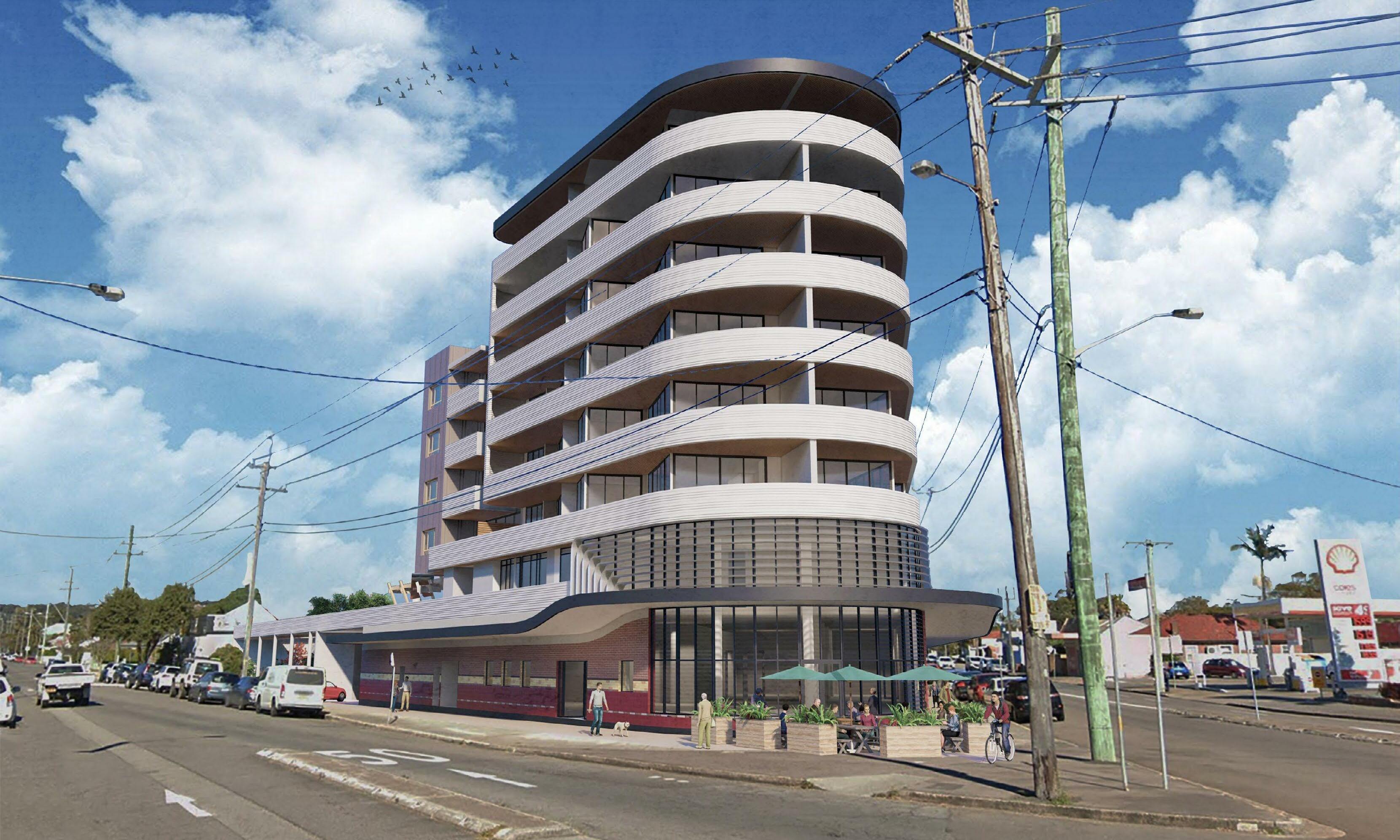
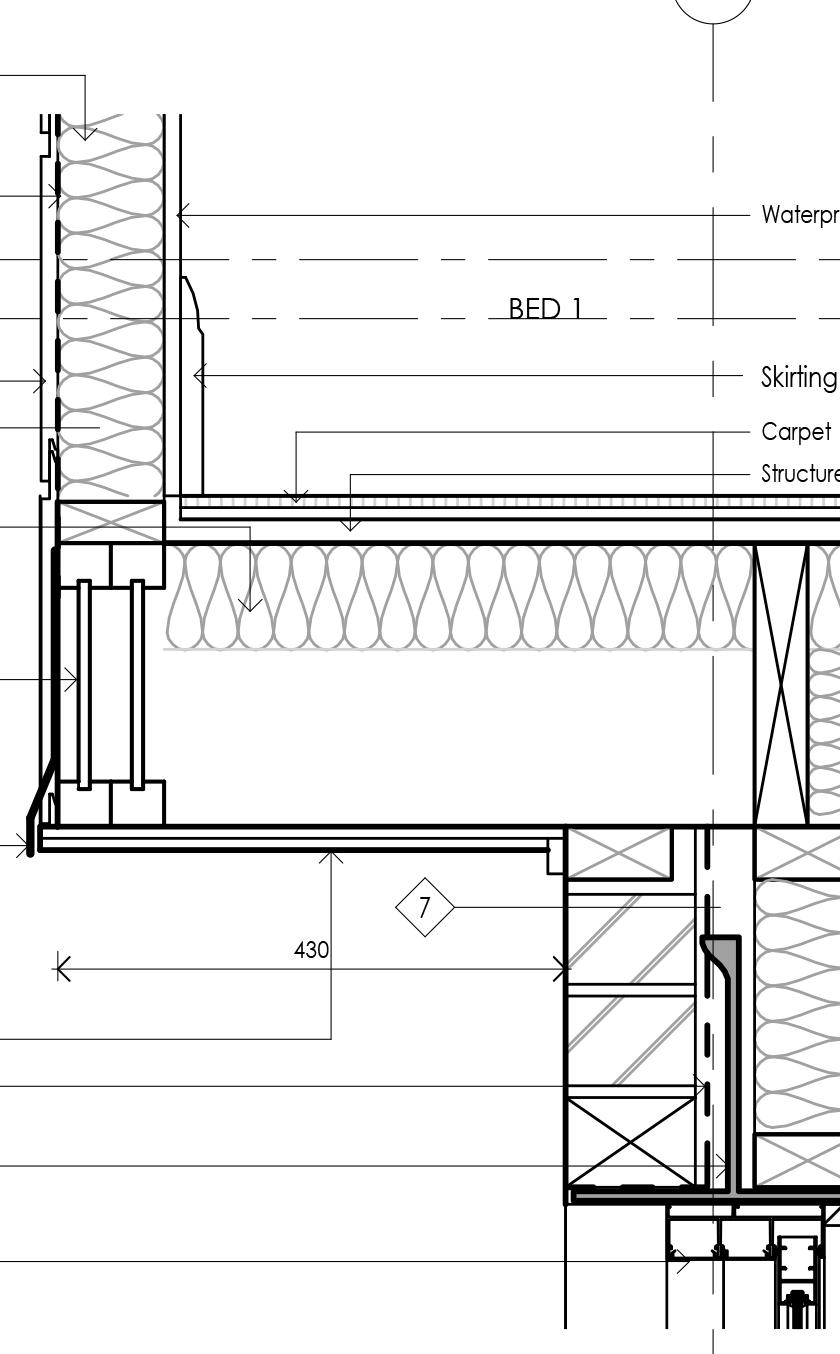
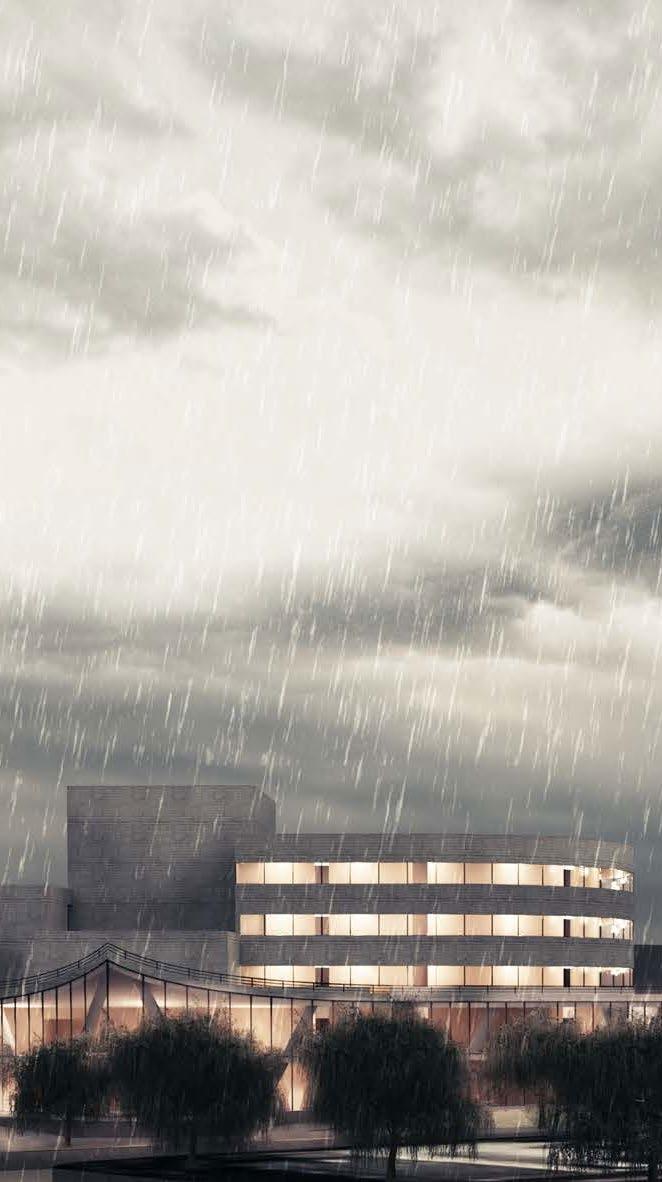

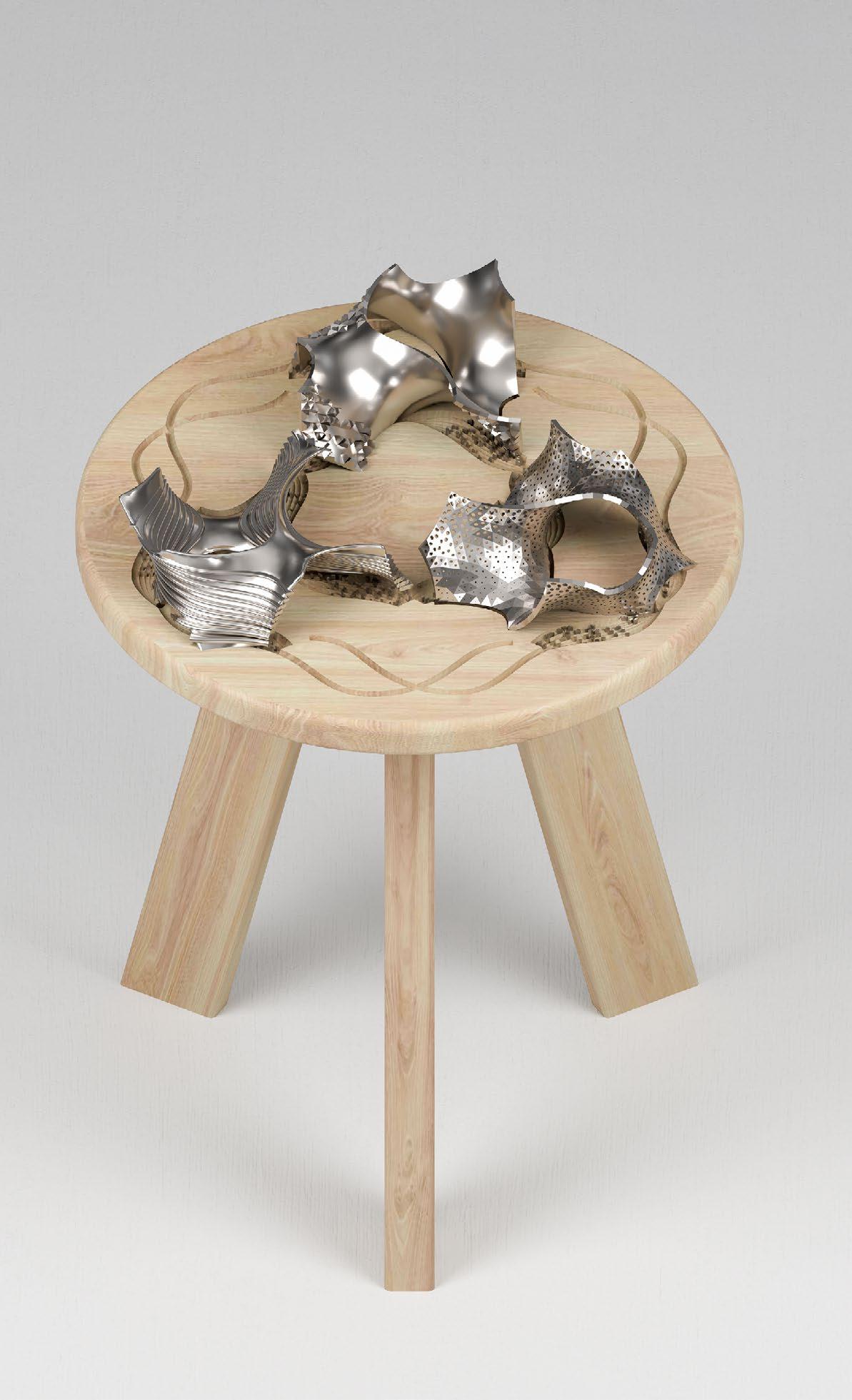
01
Historic Building Surveying and Reconstruction
Church to Co-living house (Boarding house)
The project is a surveying and renovation of a historic building, converting a church into a co-living (proposed student accommodation) by preserving the façade and demolishing the interior of the building wall.

The project process: currently in the process of preparing DA documents.
Surveying ,3D Modeling , Plan Drawings
JSA Studio / 2022- 2023 Revit
Perspective View. Site: 10 Charles St, Petersham NSW 2049
Exsiting
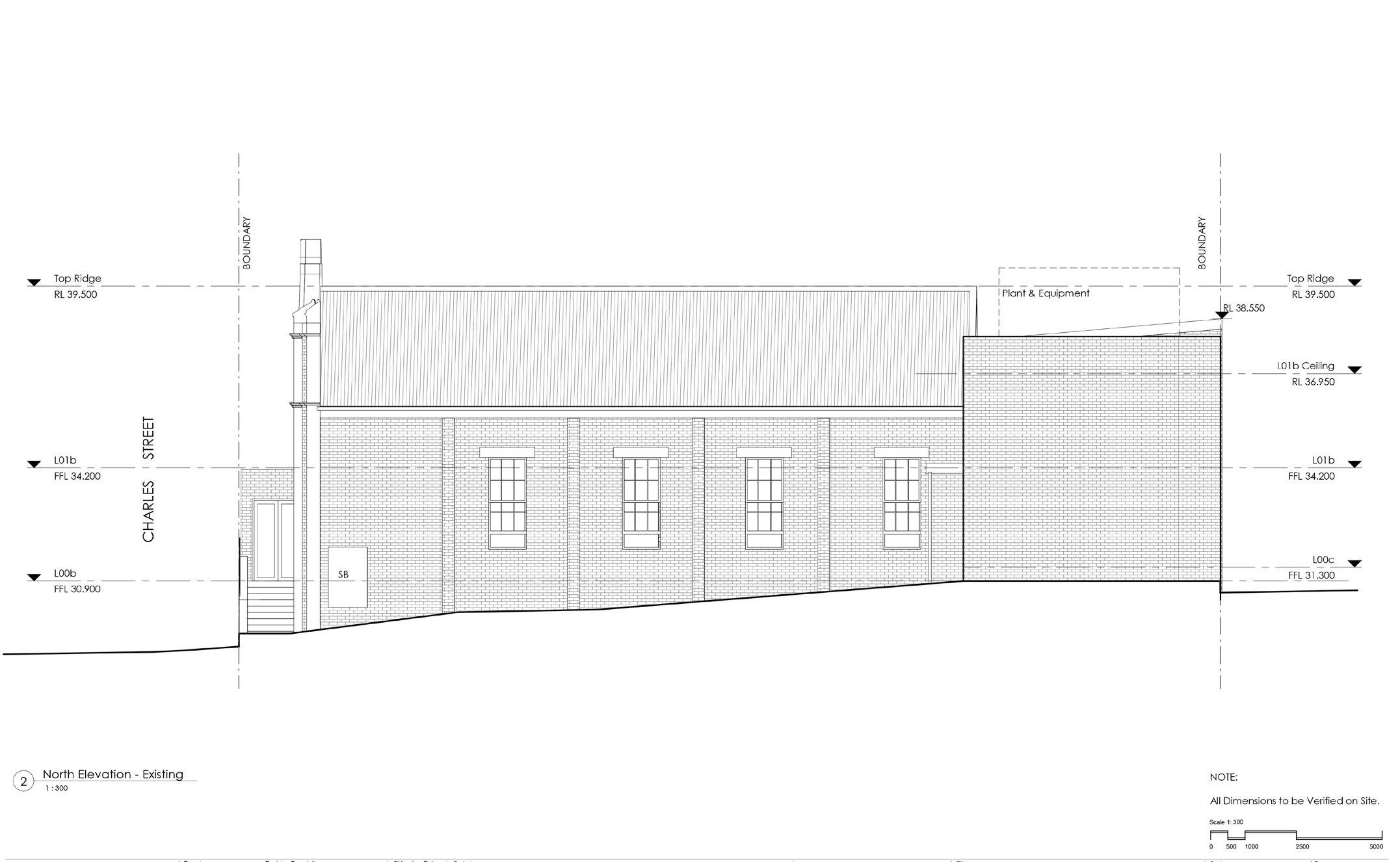
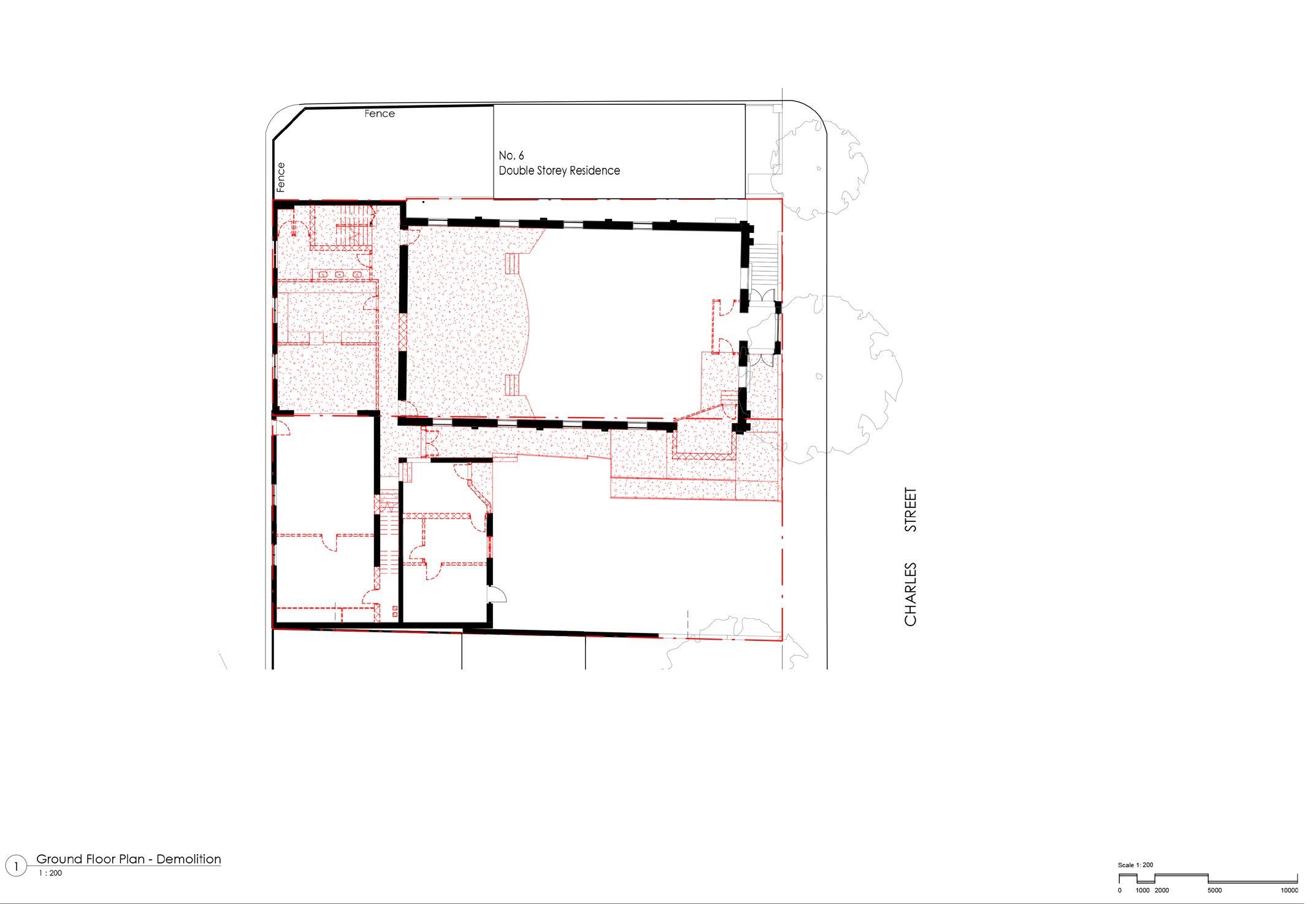

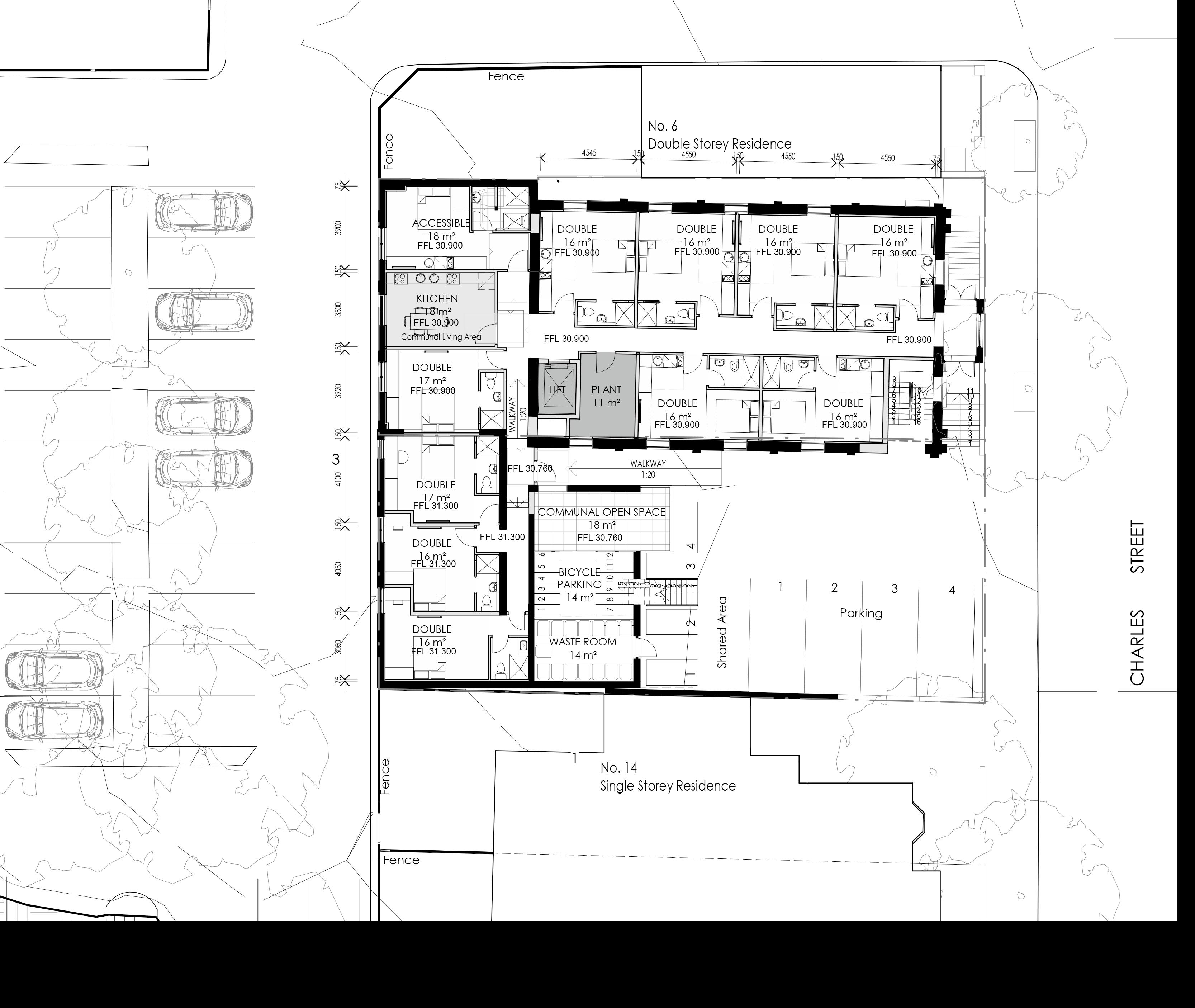 New Constructed Co-living House Ground Plan
New Constructed Co-living House Ground Plan
New Constructed Co-living House First Floor Plan
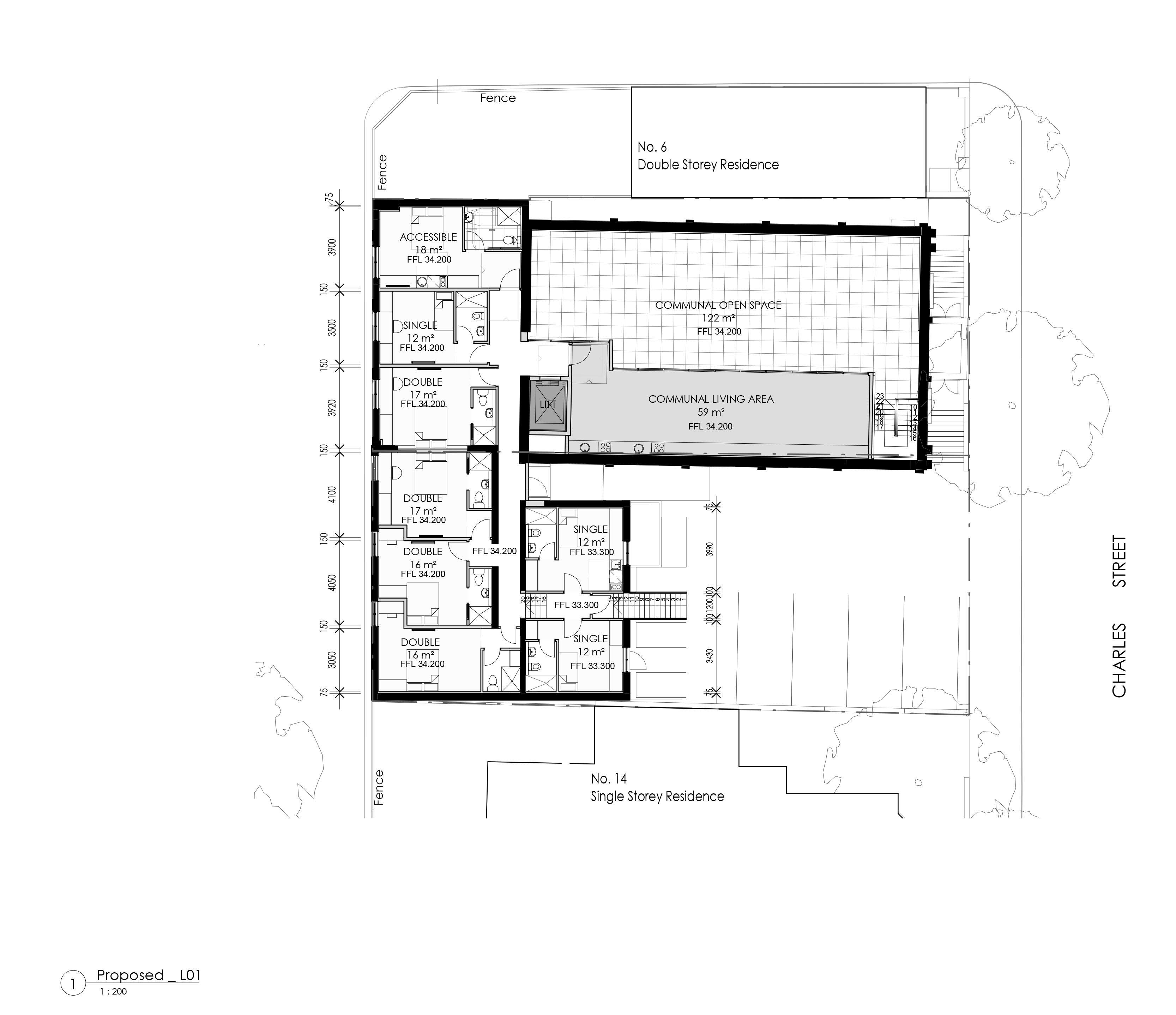
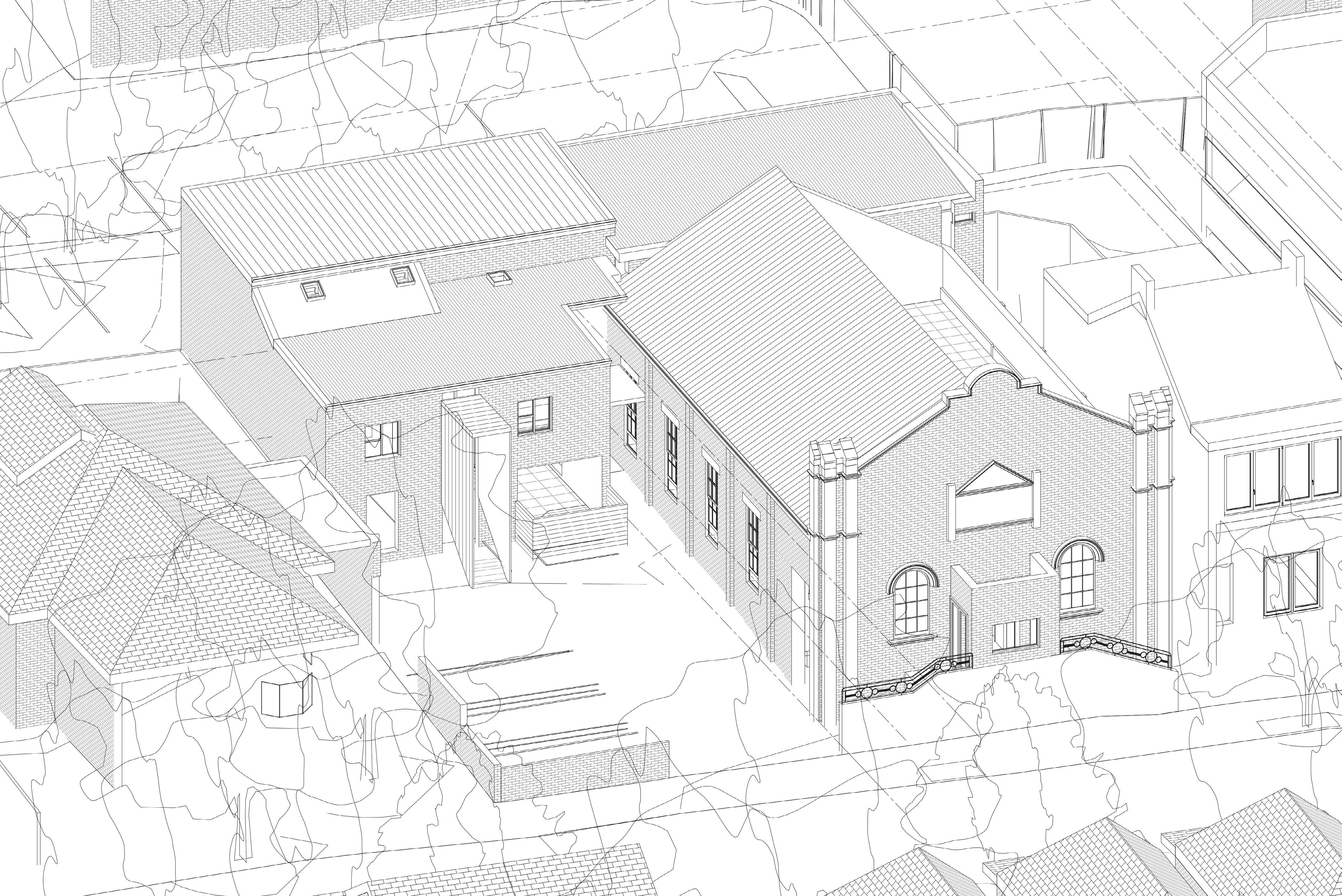 New Constructed Co-living house Perspective View (Proposed)
New Constructed Co-living house Perspective View (Proposed)
Old Tavern Renovation
Re-introduction
of the prominent corner
Reinstating a prominent corner element to address Nine Ways and form a gateway to Brunker Road. The corner element could be either a faithful reconstruction of the original building or a modern interpretation of it, although we recommend the latter. The new building at the rear of the site forms a backdrop to the corner element, which retains the original tavern function of the building, adds hotels and residential facilities. The project process: currently in the process of preparing DA documents. JSA Studio / 2022-
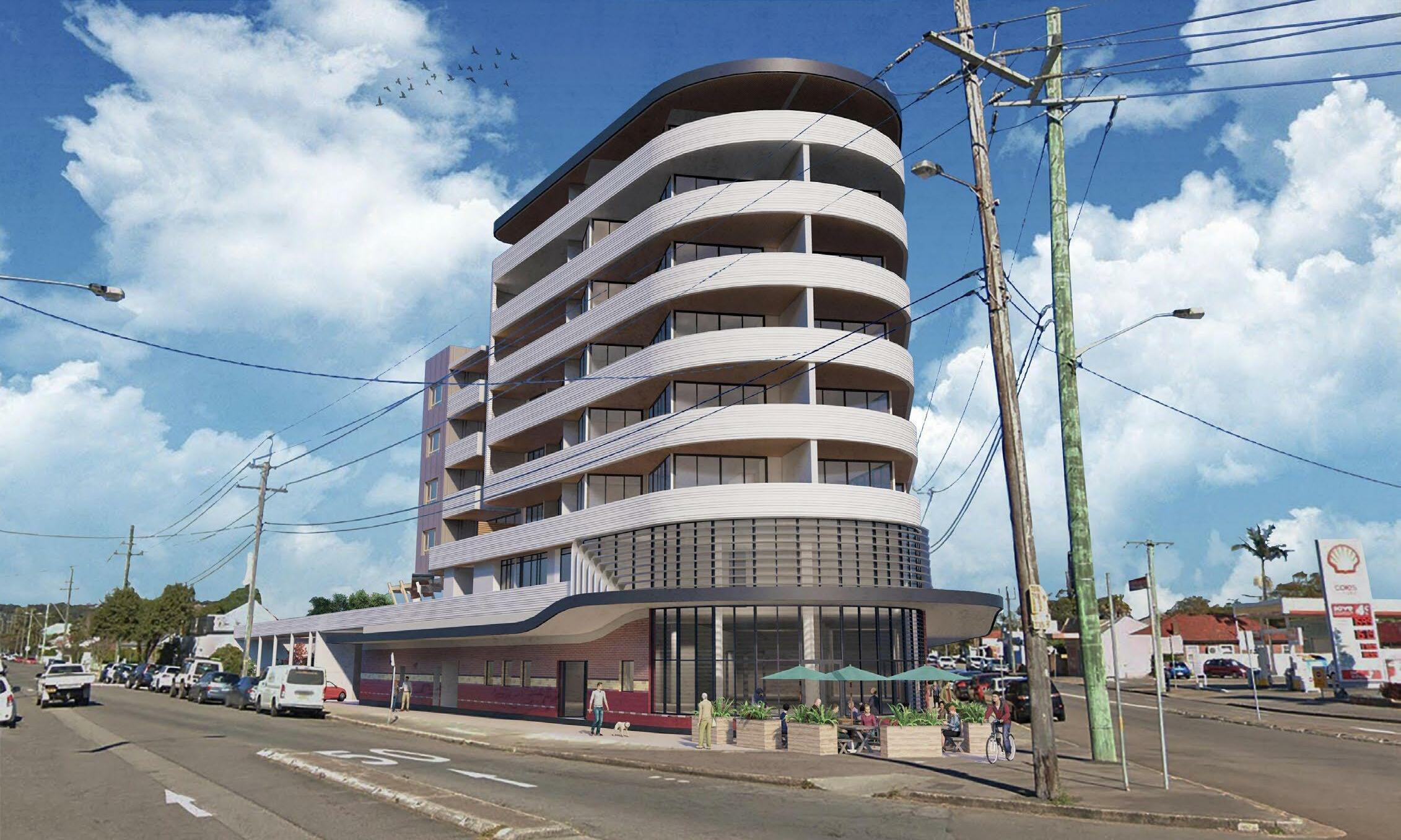
The building constructed during the 1930s addressed Nine Ways with a prominent building form and height greater than current height plane. The built form created an identity for the hotel.
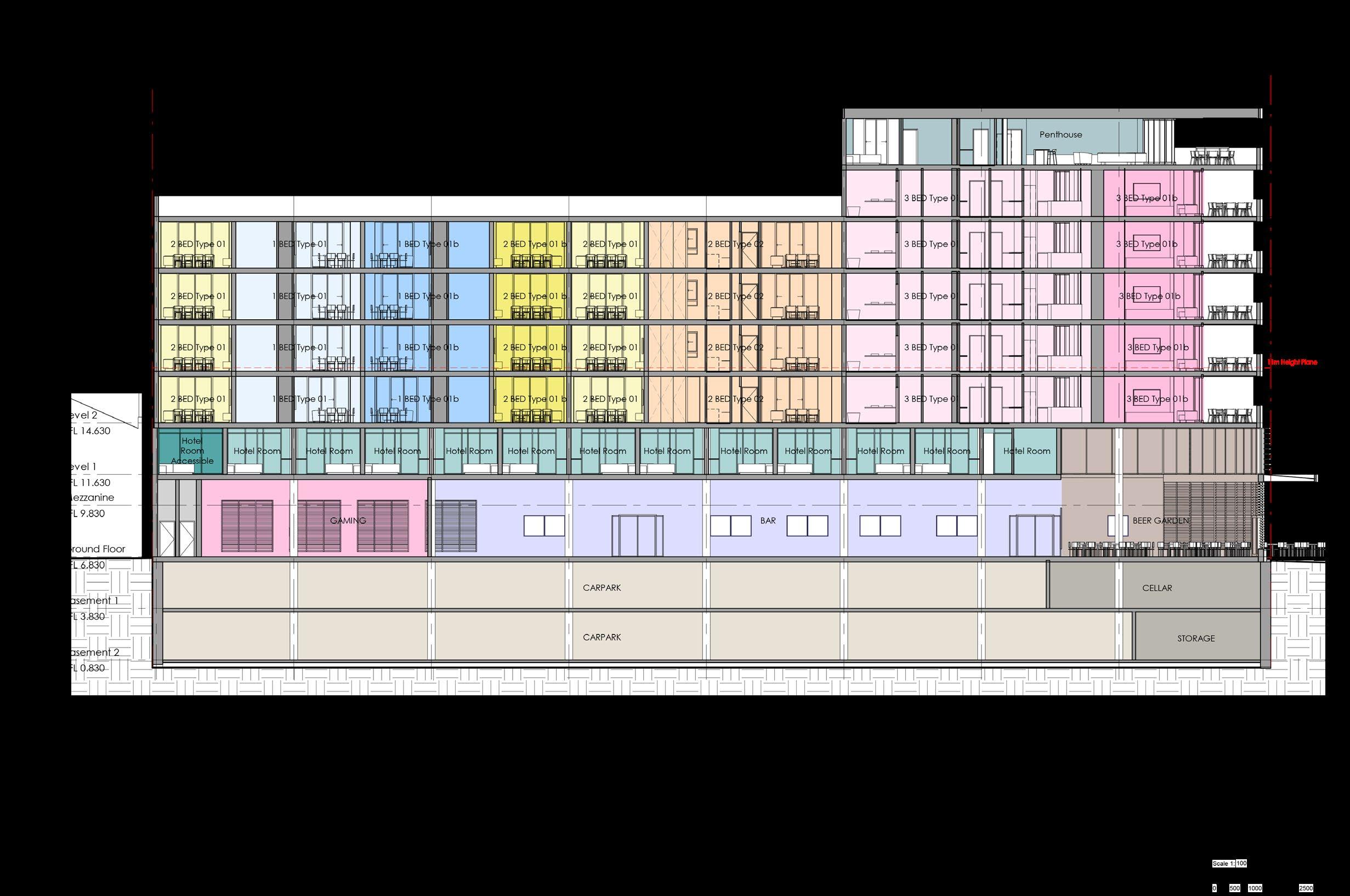
The current building occupying the site lacks identity and fails to address the prominent Nine Ways intersection.
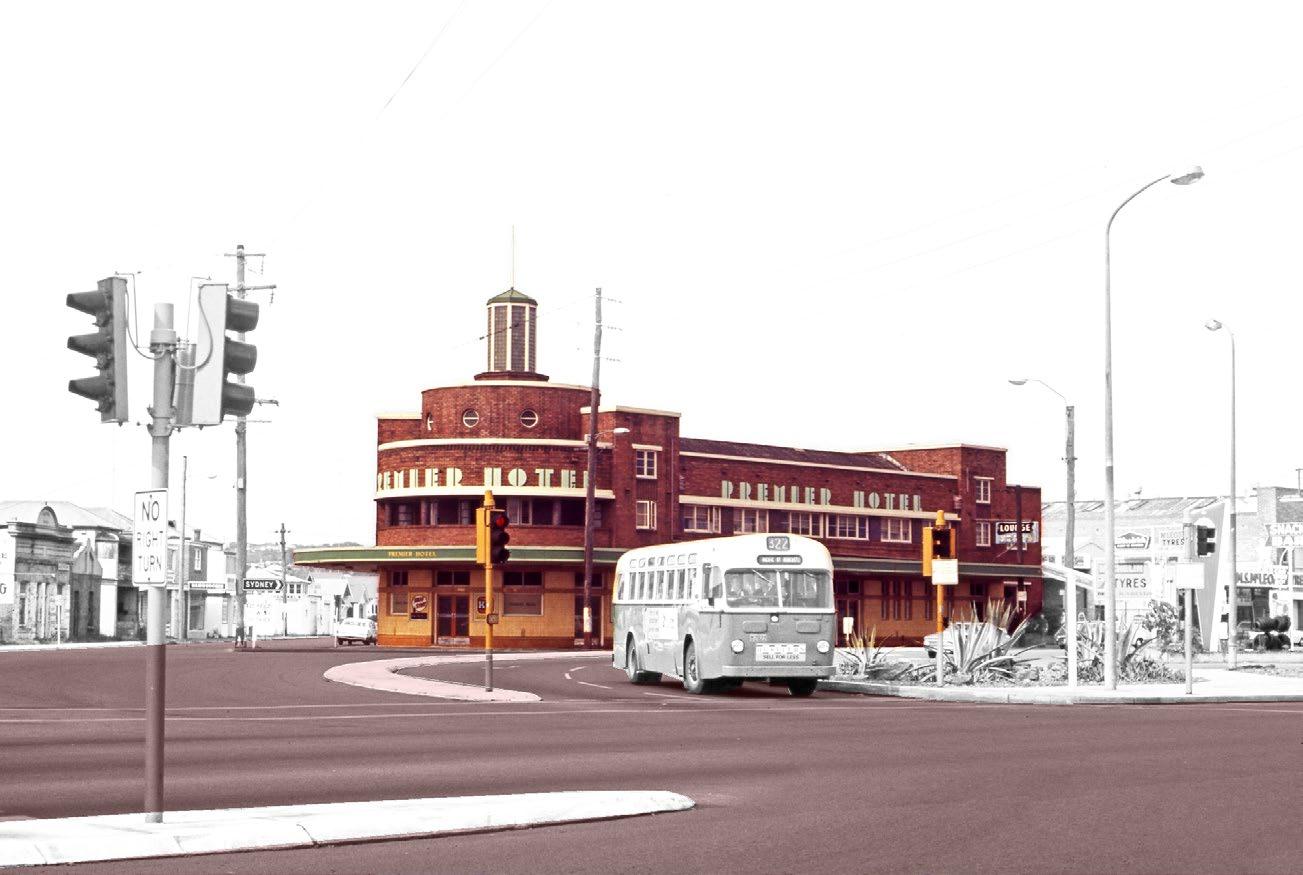
 Second Rendering view
First Rendering view
Second Rendering view
First Rendering view
Behind the building, a solid form with an open garden is used to alleviate the "corner" form of the whole building.
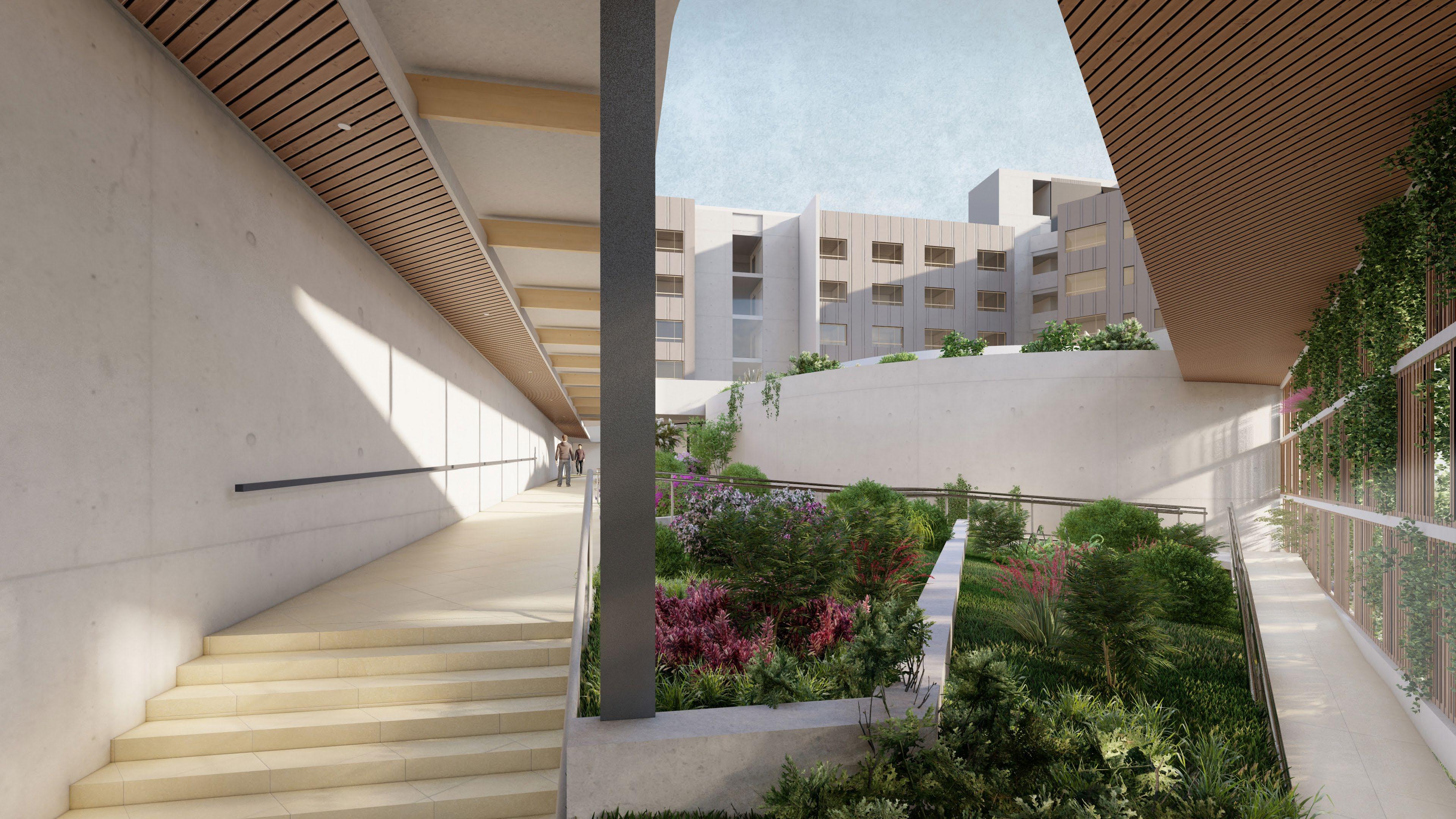 No.1 Landscape Rendering(Lumion)
No.1 Landscape Rendering(Lumion)
No.2 Entrance Fence Rendering(Lumion)
The lattice fence both ensures sufficient sunlight and privacy inside the residence. At the same time, the Beer garden on the first floor has visual communication with the Chatham street.
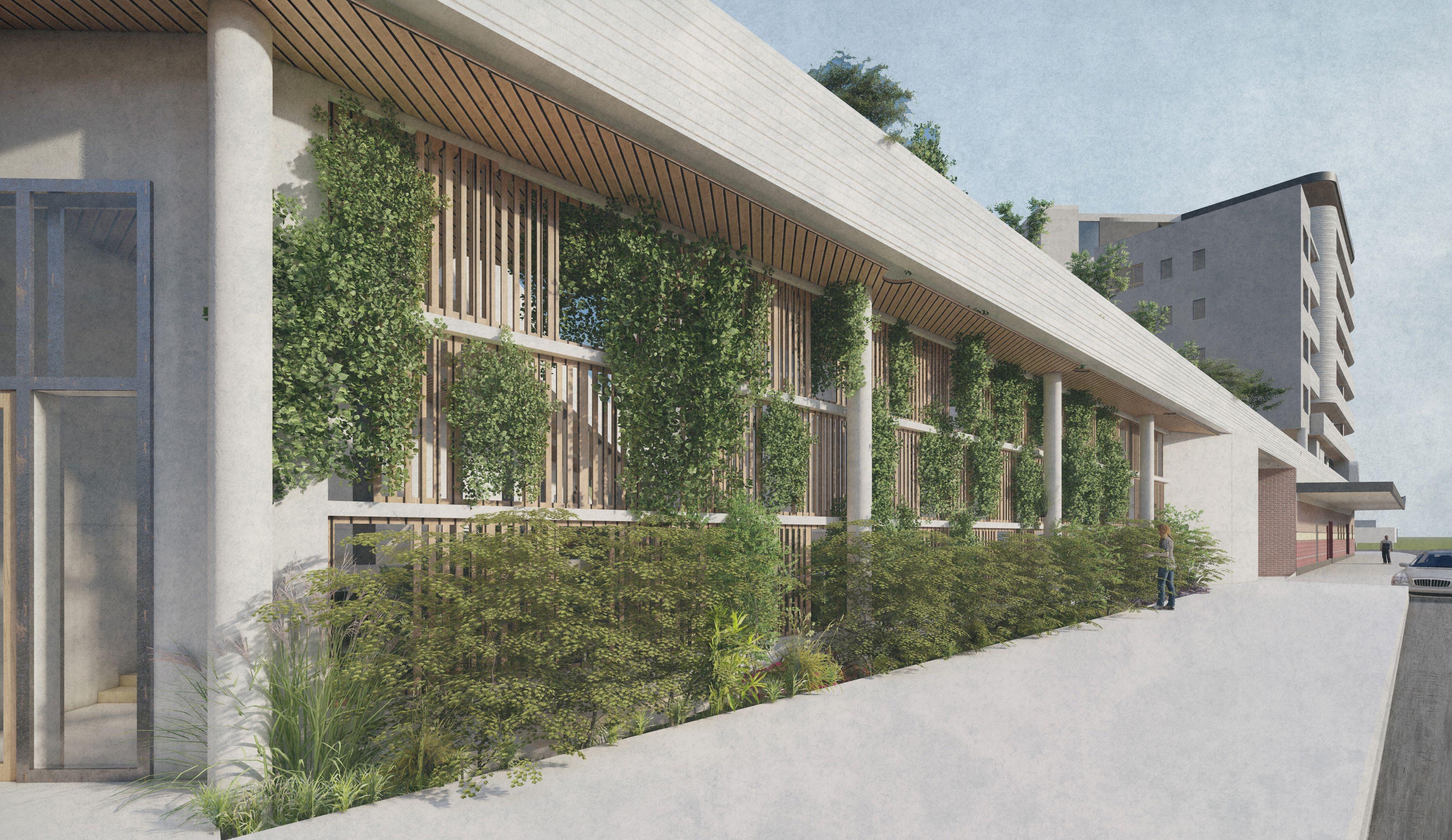
03 Architecture Detail
Drafting
In CC's documents, I am responsible for drawing standard detail, including wall, corner, roof to wall, floor to wall detail, and some fundamental electrical plan.
The project process: currently in the process of preparing CC documents.
Section detail Drawings(assist with Senior architect)
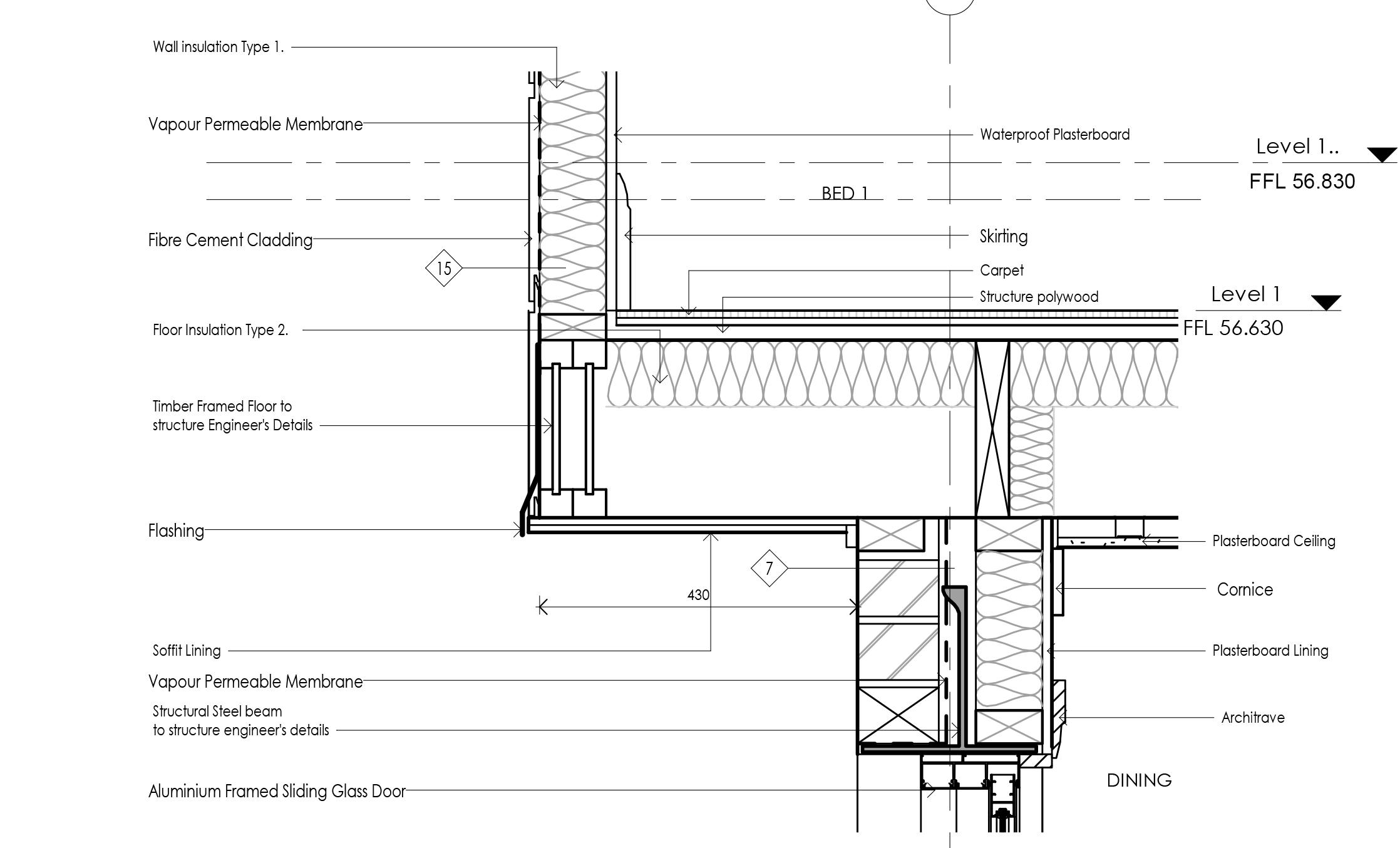
JSA Studio / 2023- Revit
Bar
Site: Bomaderry Village. Bedroom wall: 116mm(13mm cladding, 90mm Insulation, 13mm plasterboard)
Wall Section
61.285 8° 1 : 50 Wall Section 7 1 1 : 50 Wall Section 8A, 8B 2
Lintel to engineer's details RL
Metal roof sheeting Timber battens with roof blanket type 1 Timber rafters to engineer's details Roof blanket type 3 Timber framed wall with thermal insulation type 1 Aluminium framed sliding door Timber framed floor to structural engineer's details
Carpet floor Materials & Finishes Key
BED 3 BALCONY 50 © KIM JONES ARCHITECTS PTY LTD TRADING AS JSA STUDIO. ALL RIGHTS RESERVED. THIS WORK IS COPYRIGHT AND CANNOT BE REPRODUCED OR COPIED IN ANY FORM OR BY ANY MEANS WITHOUT THE WRITTEN PERMISSION OF JSA STUDIO. ANY LICENSE TO USE THIS DOCUMENT, WHETHER EXPRESSED OR IMPLIED, IS RESTRICTED TO THE TERMS OF THE AGREEMENT OR IMPLIED AGREEMENT BETWEEN JSA STUDIO AND THE INSTRUCTING PARTY.
BRF1 PT30 PT30 Title Project S u e 2 L e v e 1 5 0 5 B a m a n R d
Balustrade Type 1. BRF1 Face Bricks Type 1. PT30 Paint Type 30. TLVF1Fixed Timber Louvres Type 1.
BAL1
Timber stud wall with wall insulation type 1 0
FCL 56.430 GARAGE 250 500 1250 2500
Concrete pavers on Versipave spacers Wolfin waterproofing membrane to fibre cement sheet to fall Overflow 3000 Scale 1: Scales Checked
3 A10.05 Drawn Project No.
blanket insulation type 3 to balcony floor J S A S T U D O 1 50 @ A3 170401 Bomaderry Village PG KJ BLOCK 3
NOT FOR CONSTRUCTION Rev. Revision Description Chk.Date
Floor; Wall Section Details
Glass balustrade fixed walls to engineer's details
Concrete Pavers Height adjustable support (Elmich Versipave or similar)
Liquid membrane
Screed laid to fall to rainwater outlet
Wolfin membrane
Roof Insulation Type 3.
Flashing
Structural Steel Beam to Structural Engineer's Details
Brick with weep holes at 1200mm maximum spacing
COURTYARD
7
Mastic Sealant Aluminium Framed Sliding Glass Door
Architrave Timber Ling
BED 1 LIVING
Aluminium Framed Sliding Glass Door
Wolfin waterstop Carpet
Structural polywood
Liquid Membrane
Wolfin Membrane
Floor Insulation Type 1 Plasterboard Lining Cornice
FFL 56.830 Level 1..
Wall insulation Type 1. Waterproof Plasterboard Skirting Carpet Structure polywood
Vapour Permeable Membrane Fibre Cement Cladding
Timber Framed Floor to Structural Engineer's Details
Plasterboard Ceiling
Timber Framed Floor to structure Engineer's Details
Flashing
15 7
Soffit
Vapour Permeable Membrane Structural Steel beam to structure engineer's details
Floor Insulation Type 2. 430 B
1 10 Section E -Callout 1 -Callout 1 1
FFL 56.780 Level 1.
FFL 56.630 Level 1
Lining Cornice Plasterboard Lining Architrave Plasterboard Ceiling
FFL 56.780 Level 1. FFL 56.830 Level 1.. BED 1 DINING
Metal Tophat Section Plasterboard Ceiling
Aluminium Framed Sliding Glass balustrade fixed walls to engineer's details Concrete Pavers Height adjustable support (Elmich versipave or similar) Liquid membrane Screed laid to fall to rainwater outlet Structural steel beam to structural engineer's details Wolfin membrane Plasterboard Lining
Plasterboard Lining
Waterproof plasterboard
Skirting
1 : 10 Wall Section 4 -Callout 1 4 1 10 Wall Section 5 -Callout 1 5 1 : 10 Wall Section 6 -Callout 2 6
Rev. Revision Description Chk.Date
Carpet Structure Polywood Floor insulation Type 2 Timber Framed Floor to structure Engineer's Details Suspended Plasterboard Ceiling Wall Tiling Waterproof Plasterboard
D FFL 56.780 Level 1. FFL 56.830 Level 1.. BED 2 LDY 01
FFL 56.630
Wall insulation Type 1. Vapour Permeable Membrane Fibre Cement Cladding Flashing
264 0
Soffit lining 10
Wall Insulation Type 1. Timber Stud Frame
Vapour Permeable Membrane
100 © KIM JONES ARCHITECTS PTY LTD TRADING AS JSA STUDIO. ALL RIGHTS RESERVED. THIS WORK IS COPYRIGHT AND CANNOT BE REPRODUCED OR COPIED IN ANY FORM OR BY ANY MEANS WITHOUT THE WRITTEN PERMISSION OF JSA STUDIO. ANY LICENSE TO USE THIS DOCUMENT, WHETHER EXPRESSED OR IMPLIED, IS RESTRICTED TO THE TERMS OF THE AGREEMENT OR IMPLIED AGREEMENT BETWEEN JSA STUDIO AND THE INSTRUCTING PARTY. ALL DIMENSIONS IN MILLIMETRES UNLESS OTHERWISE SHOWN. USE FIGURED DIMENSIONS ONLY. DO NOT SCALE FROM DRAWINGS. CHECK ALL DIMENSIONS ON SITE PRIOR TO CONSTRUCTION. REPORT ANY DISCREPANCIES TO JSA STUDIO. TO BE READ IN CONJUNCTION WITH ALL OTHER DOCUMENTS. NSW ARCHITECTS REGISTRATION BOARD REGISTERED ARCHITECTS: KIM JONES Registration No. 6460
Scale 1: Scales Checked
500 1000 2500 5000
Title Project Approved P O B o x 4 8 3
S u t e 2 L e v e 1 5 0 5 B a m a n R d L y f e d N S W R o z e e N S W 2 0 3 9 p h o n e 02 9555 7464 a x 02 9555 7436 For
Drawn Project No. Drawing No. Revision
J S A S T U D I O 1 10 @ A3 Details 170401 Bomaderry Village SABRA COMPANY PTY LTD
Author Checker A10.04 Approver 315 Princes Highway, Bomaderry
THEATRE OF VITALITY
ARCHITECTURE IN TRANSFORMATION
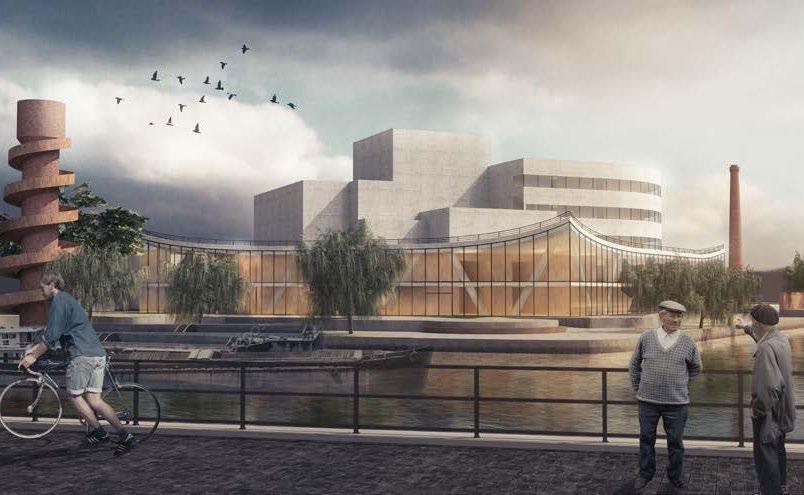
The theme of the competition is that due to failed planning or lack of planning on the urban fringe, parts of satellite cities as well as suburbs these areas are often fragmented and in urgent need of reconstruction.We design theme is how to revitalize a satellite city that was previously a heavy industry.
After the industrial boom of the late 20th century in China, left behind many abandoned factories in suburb. These factories are facing a difficult situation - transformation. How do we deal with these abandoned factories? My solution was to build buildings on the abandoned sites and transform the abandoned factories into public cultural buildings to give new vitality to the suburb. All the new buildings there are done in a new way, no longer as factories, but as cultural longevity.
The road network in the selected area is precise. It is accurate and allows easy identification of entrances and exits.The entire site is surrounded by town main roads and collector street.
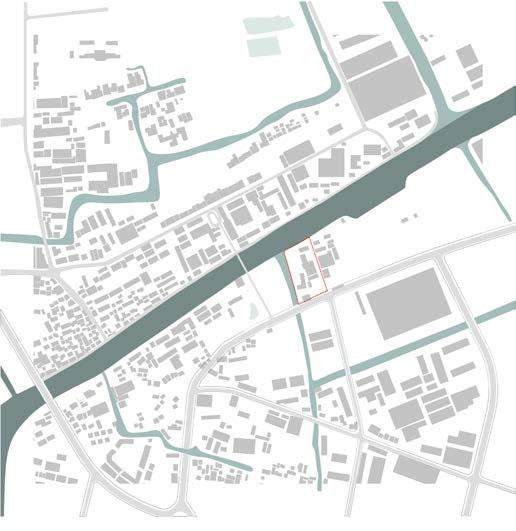
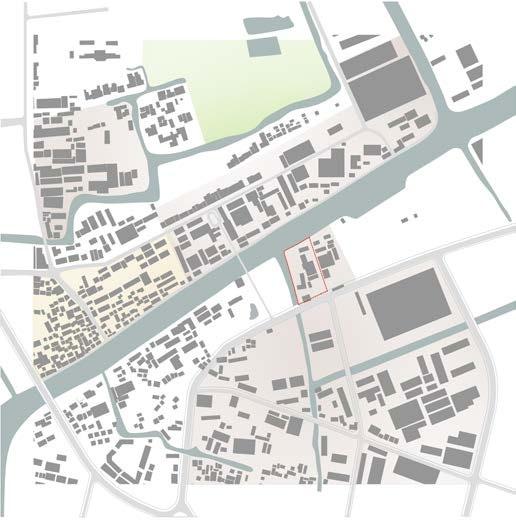
Inside the selected area, are old or abandoned factories.The location is also near the residantial and agricultural district.
The analysis diagram shows that there are almost no public buildings in the entire town of Tongxiang.The area includes 20% agricultural land, 65% of industrial land and 15% of residential land.
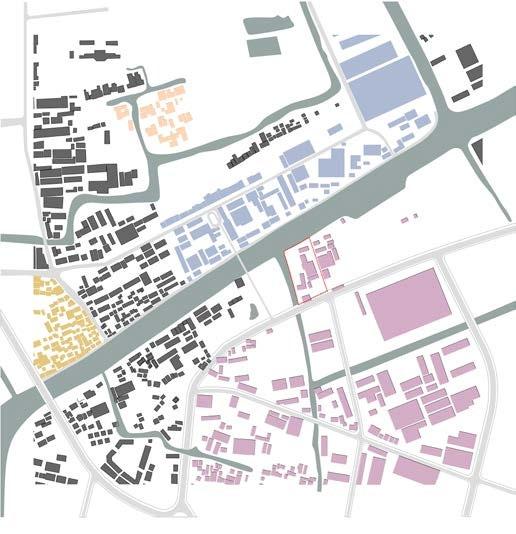
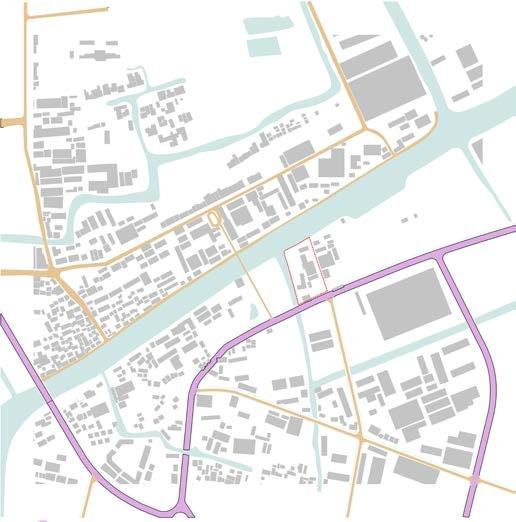
An important mode of transportation in this rural industrial town.The industry in this village is the canal.The back of the building is what was once the largest canal in Chinese history, so incorporating a water-friendly landscape is also important to consider, as well as flood control.

The main building block has been designated be bounded by a old industrial building line .

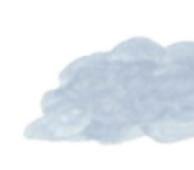
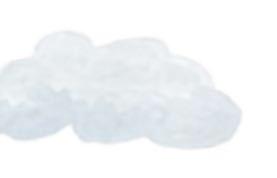
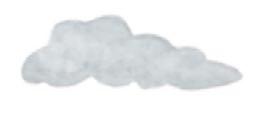

In consideration of the height of the surrounding buildings, biggest building block will be created the on the ground floor.

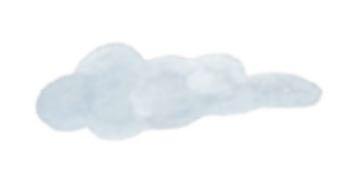


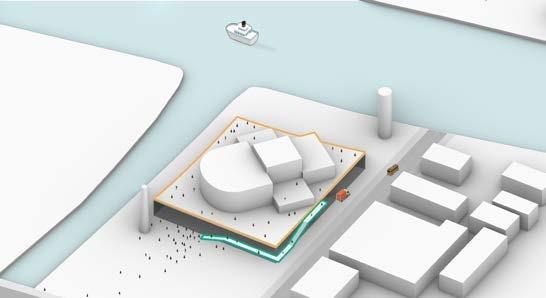
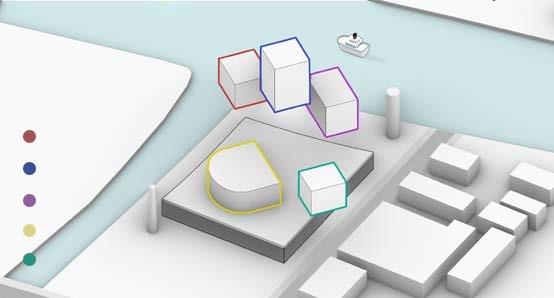
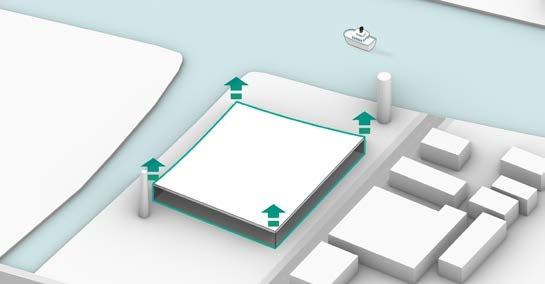
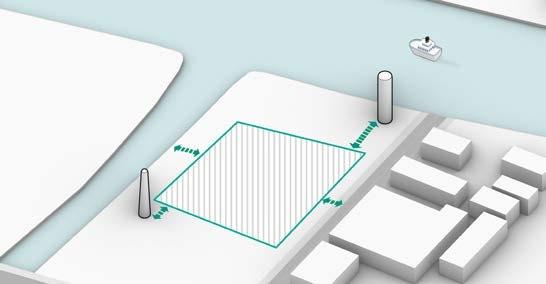
The main theatre structure be positioned on the bottom block, and maintained a volume that was not too enormous.
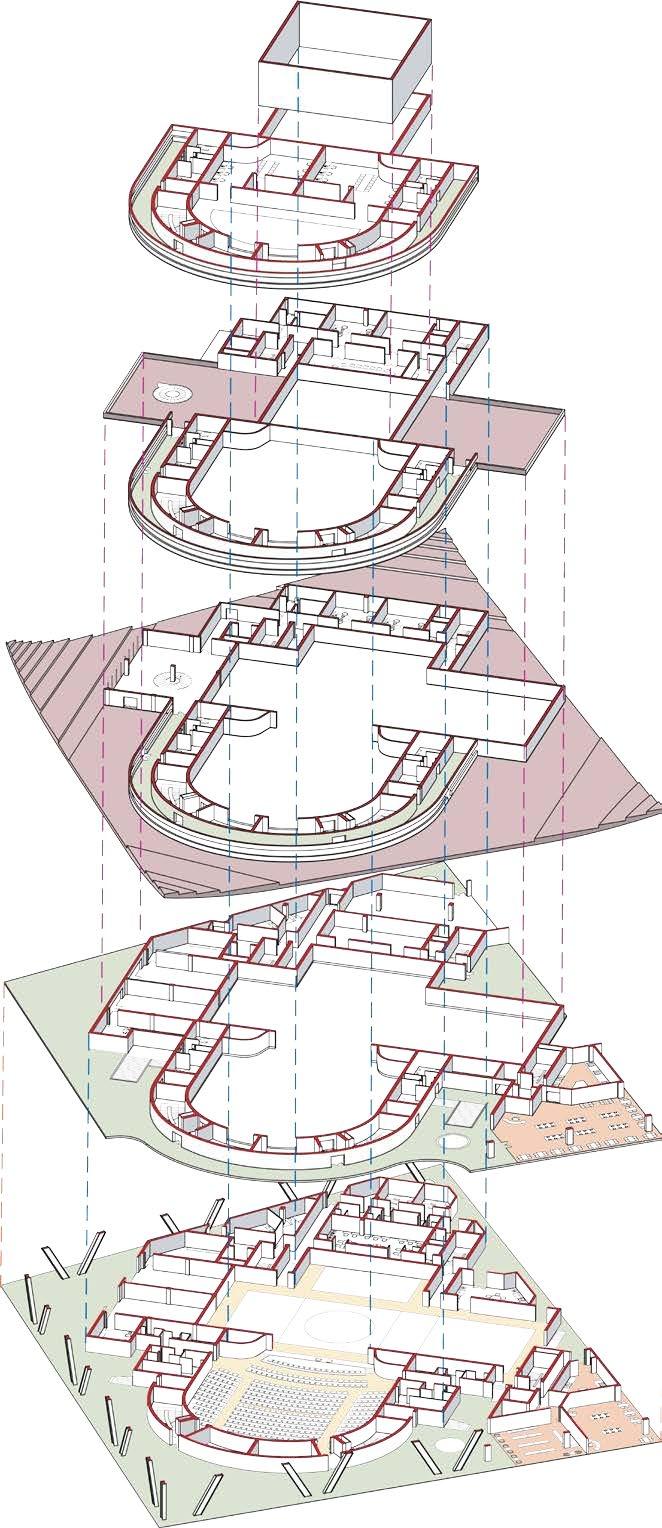
Arranging the pedestrian flow arround the building onto the platform by using an L-from ladder.
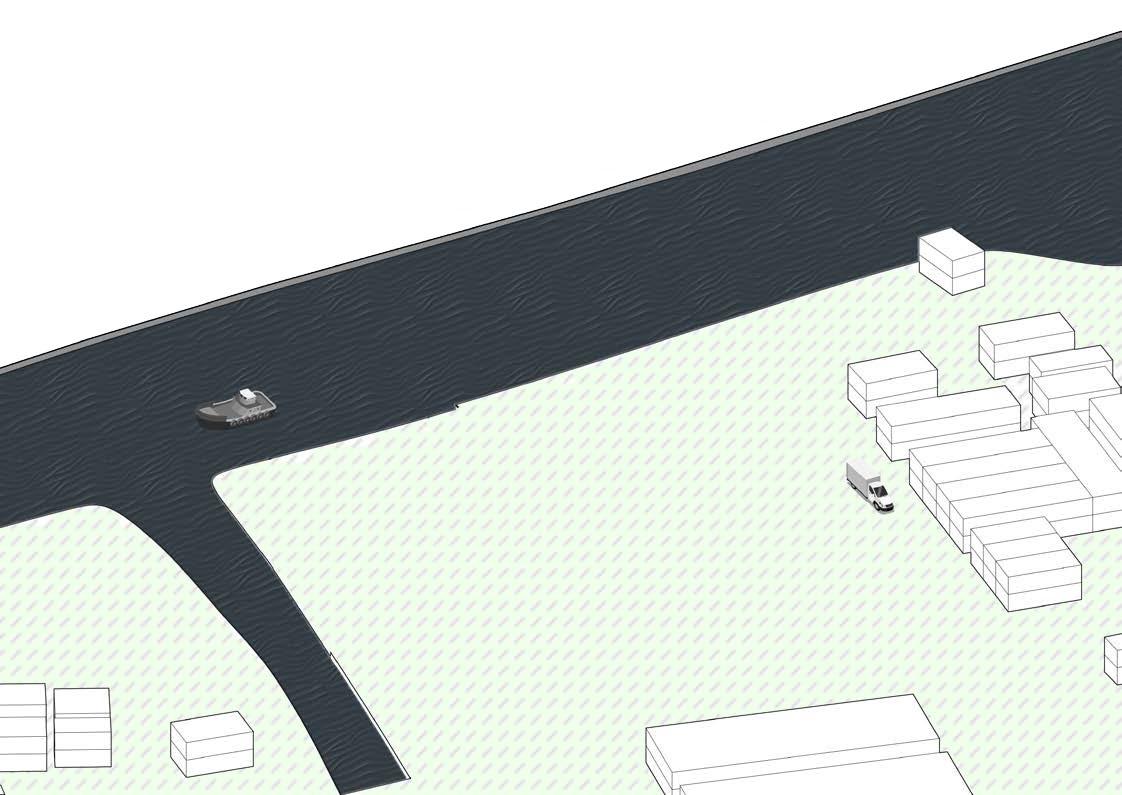
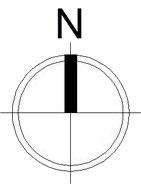
Ground Floor Plan
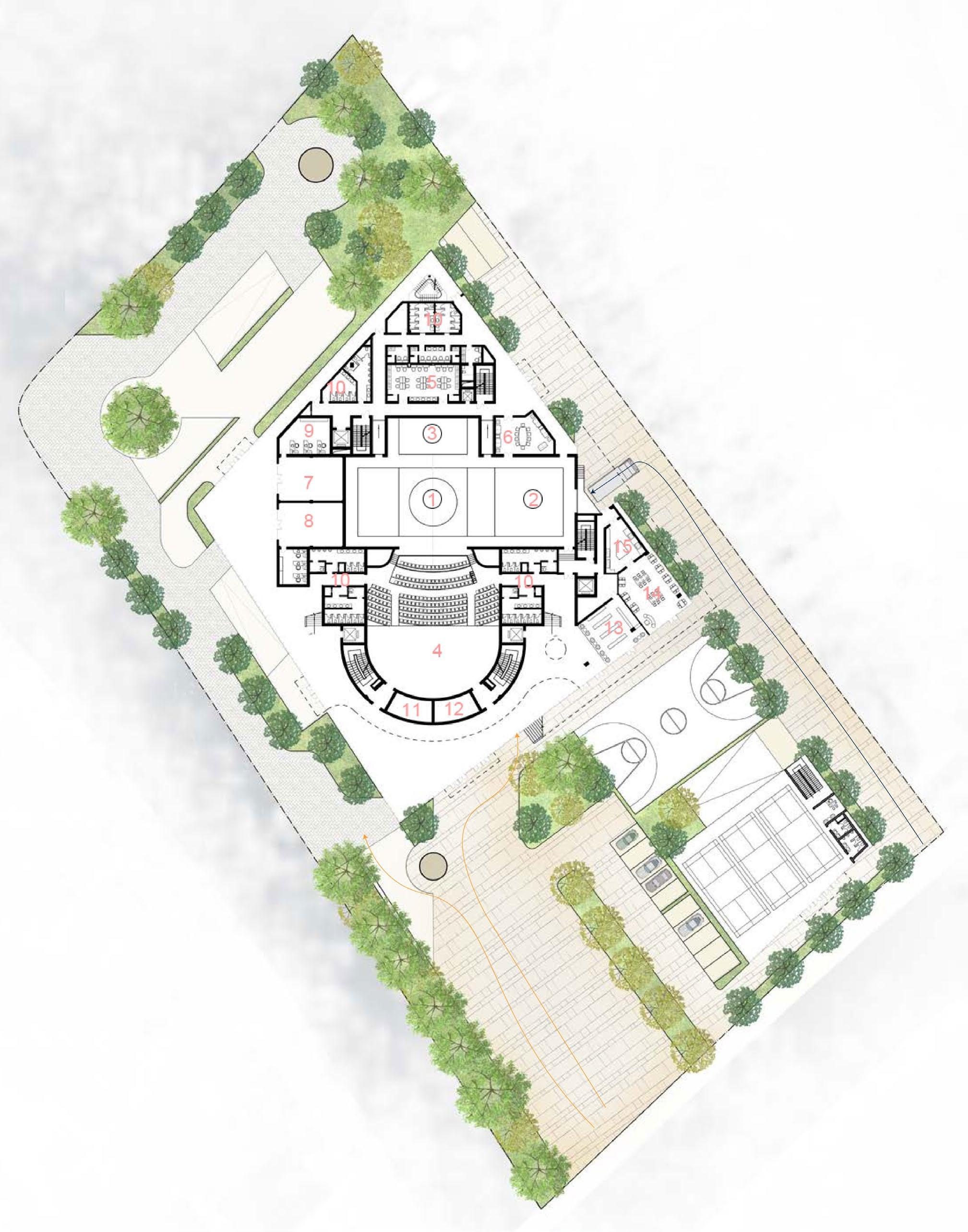
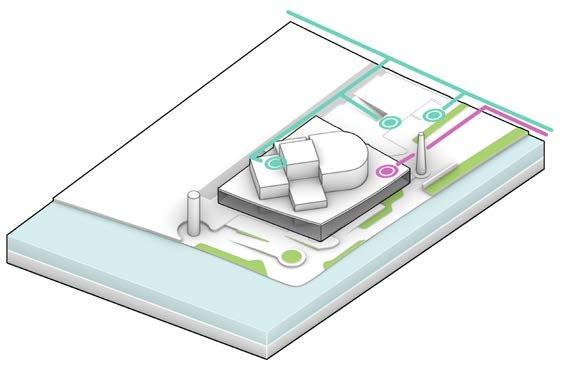

1.Main Stage
2.Secondary Stage 3.Rehearsal Hall
4.Auditorium
5.Dressing Room
6.Waiting Room
7.Dance Classroom

8.Music Classroom
9.Office
10.Rest Room
The staggered blocks form several outdoor spaces that provide good views, similar to the watchtowers of the north.These amazing spaces create more opportunities for people to interact with the environment and to better understand the history of the Beijing-Hangzhou Grand Canal next to the theater.
Along the red line (pedestrian line), there are landscapes providing abundant space for space for pedestrian traffic. The area also offers a variety of event spaces to visitors.and connects the chimneys maintained by the original factory and watchtower.
The pedestrian system is separated from the vehicle system by a parking lot with a car entrance. There is also an entrance to the south and a pedestrian entrance to the east.
In consideration of the low water line in the location, an altitude structure has been built to connect the bank closer to water. In addition, several slopes around the building connect to the high levels of that structure.
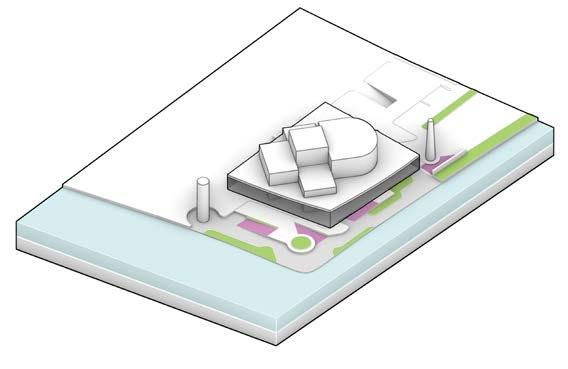
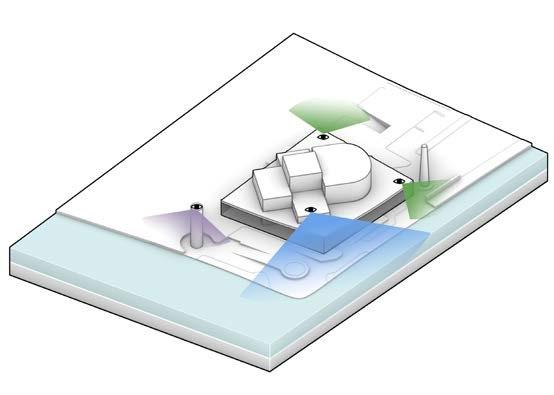
11.Ticket Office 12.Bag Keeping 13.Rehearsal Hall 14.Restaurant 15.Kitchen Room


 View Diagram Surrounding Spaces Diagram
Guideline Diagram Flood Protection Diagram
North Pedestrian
Vehicle
View Diagram Surrounding Spaces Diagram
Guideline Diagram Flood Protection Diagram
North Pedestrian
Vehicle


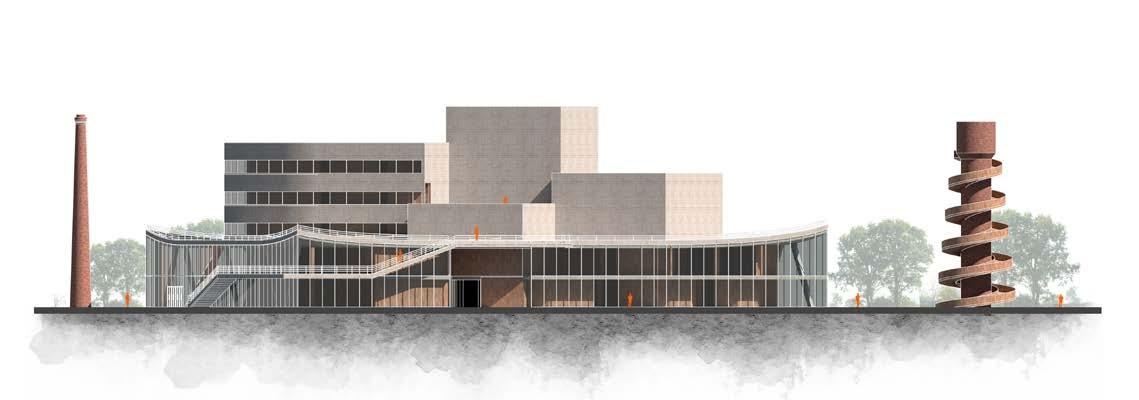
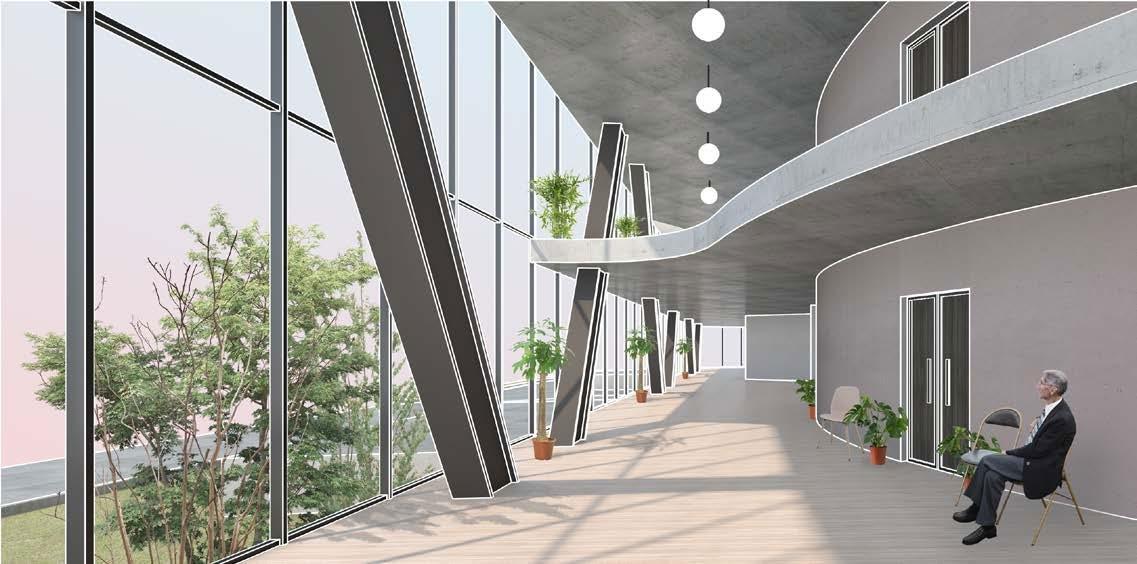
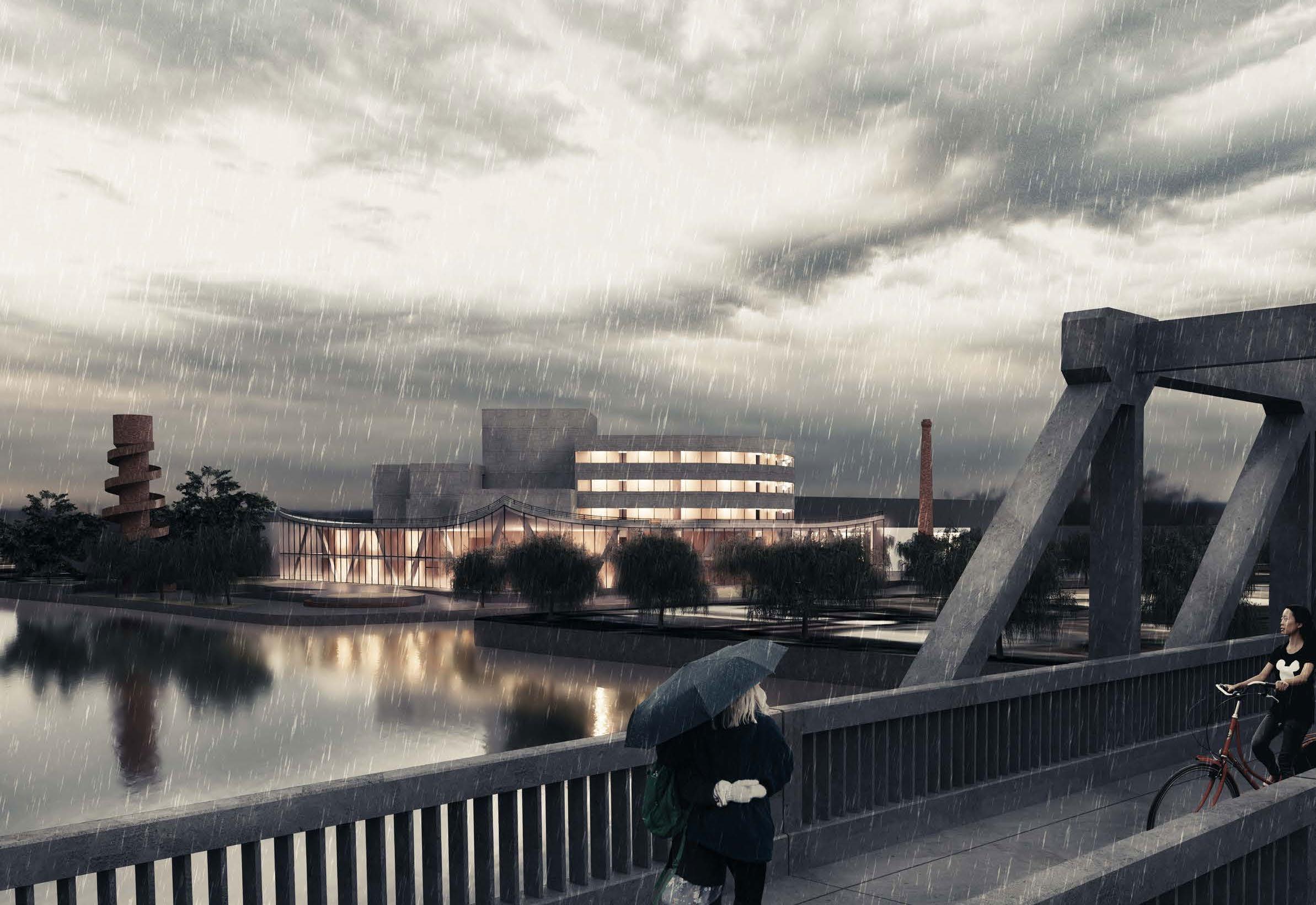
BAMBOO; RATTAN PAVILION
Bamboo has been used in people planting and using bamboo for thousands of years, from the raft to construction to indoor potted plants. In addition, the sustainability of bamboo can reduce the pollution of traditional building materials.
Furthermore, the bamboo structure cover with local rattan plants, twining is the characteristic of this vegetation. Because the rattan can be firmly wound to the bamboo structure, and even after the bamboo structure is corroded or destroyed, the original space can bestill maintained by rattan. Therefore, the purpose of our pavilion is to use bamboo as the initial material of the pavilion, then rattan can replace the original bamboo structure after the bamboo structure has been deconstructed for several years to design a sustainable pavilion.
The dot size represents the growth conditions of the bamboo. The smaller the spot represents the local environment is the less sutiable for bamboo growth. Conversely , the larger spot,means that the environment is more suitable for growth. Green represents the distribution of bamboo in the world. Rattan native from blue circle .Consequently, we consider the overlap area can be pavilion location.
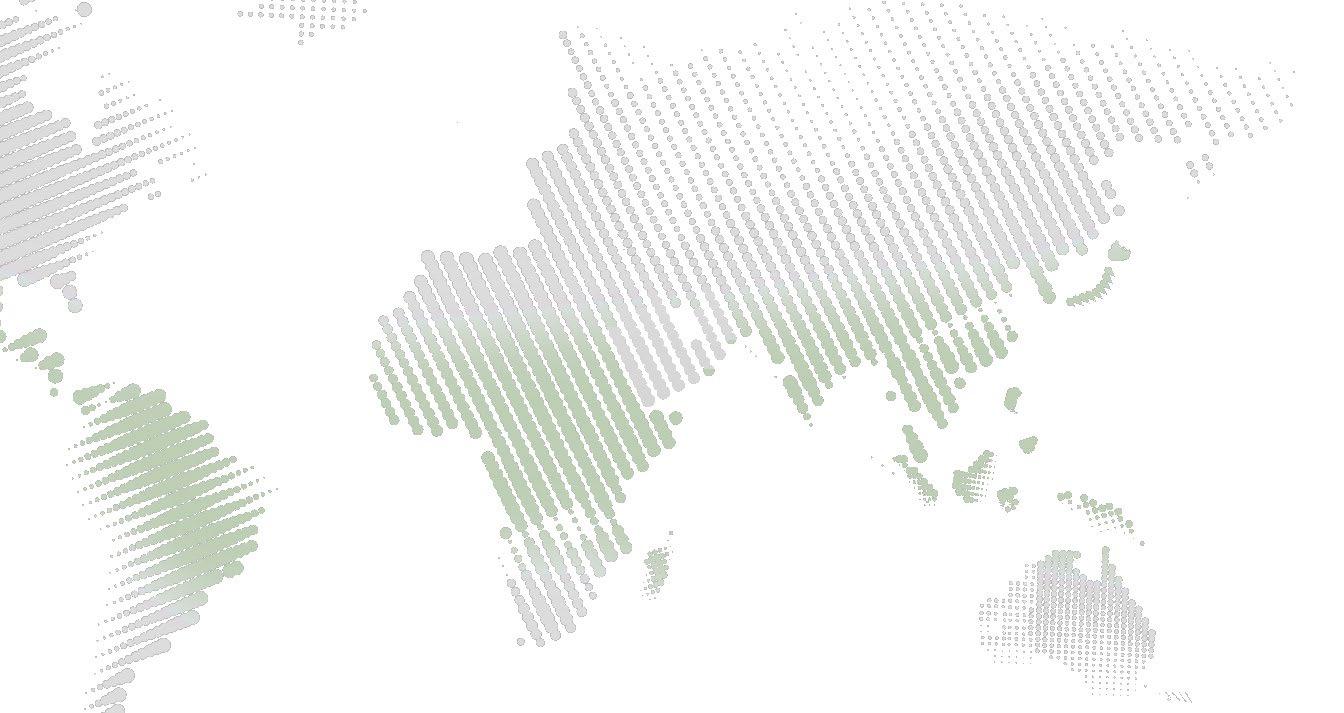
Parameters of Pavilion Form
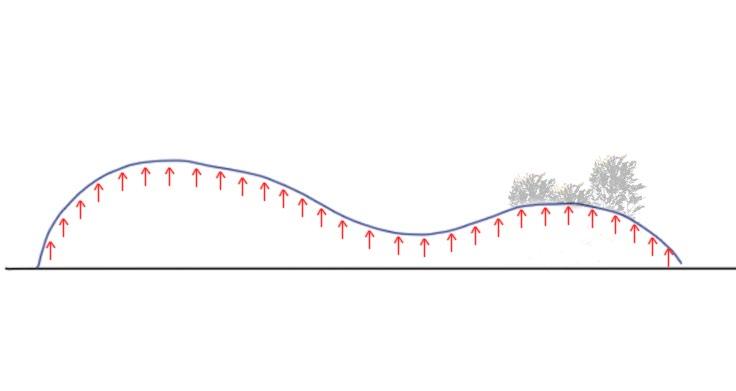

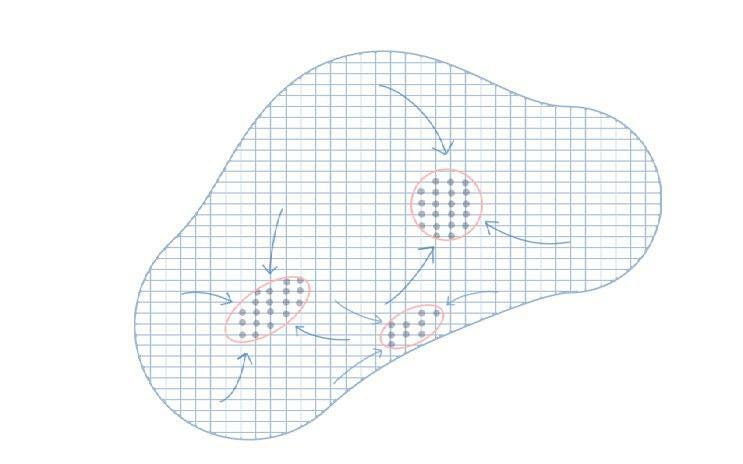
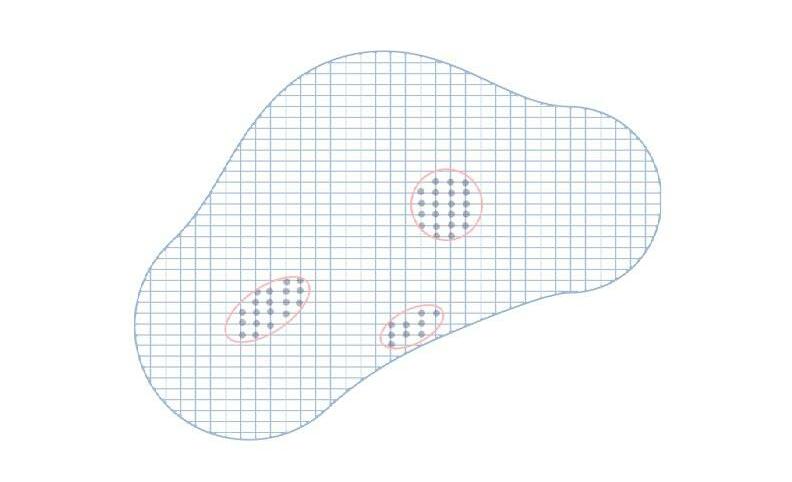

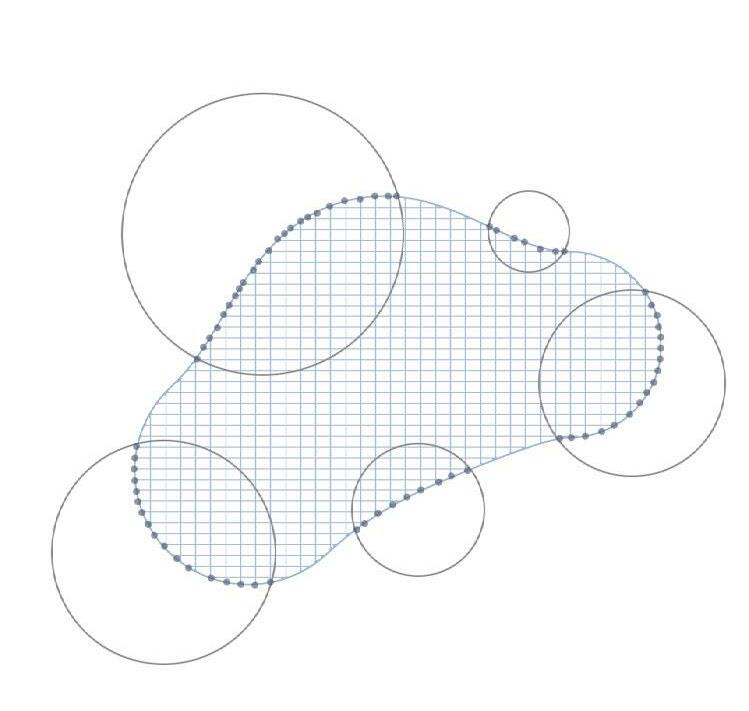


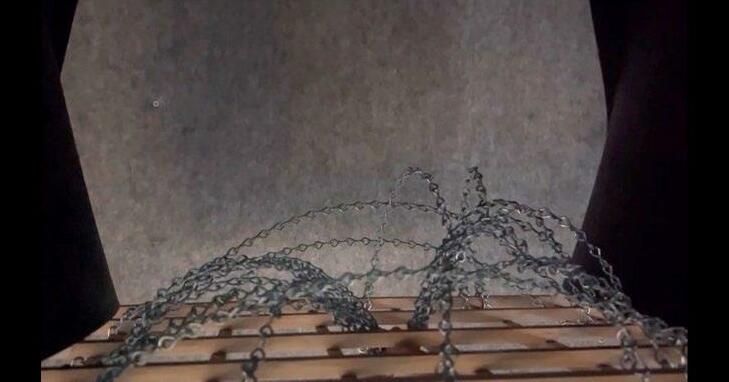
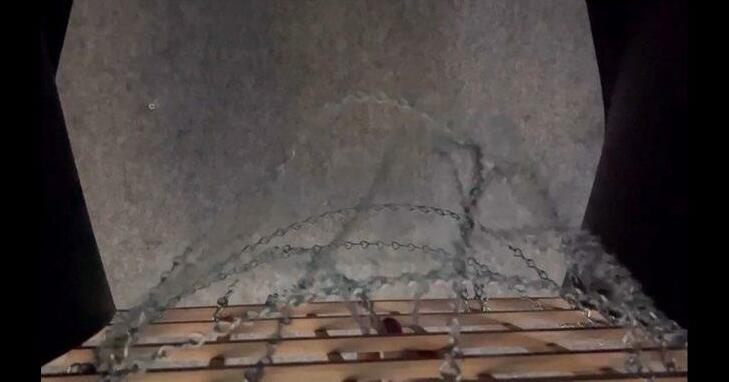
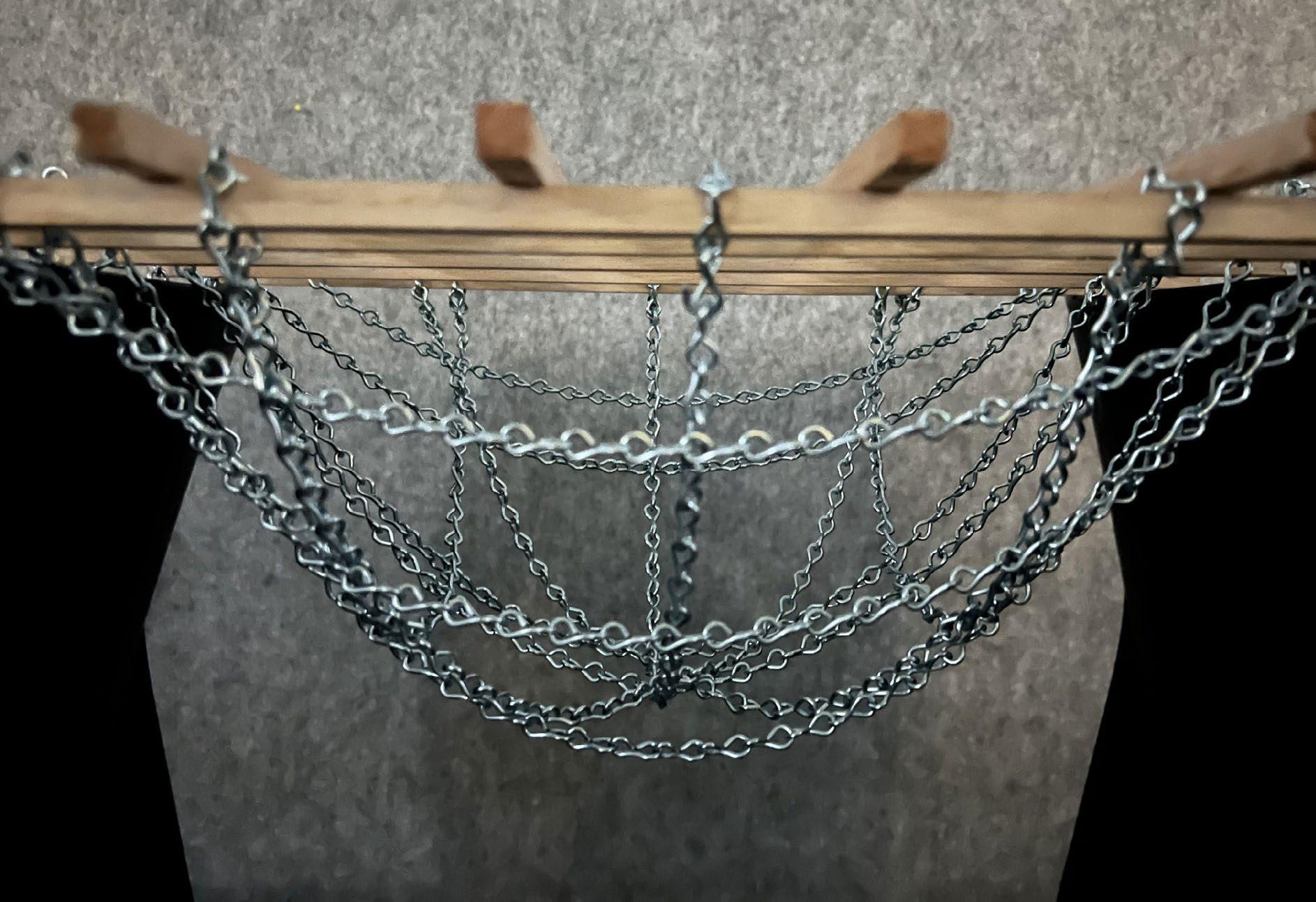
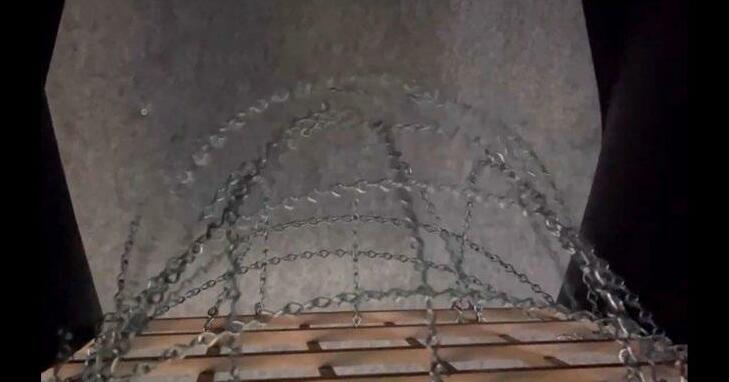
Interior Sketches
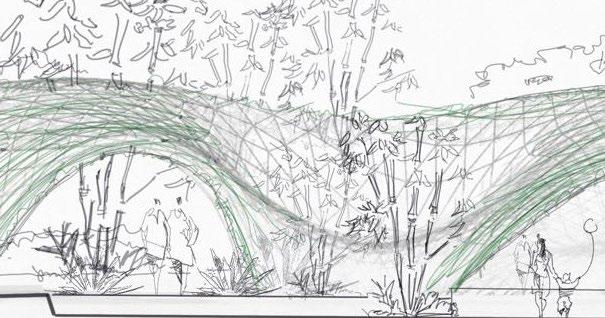


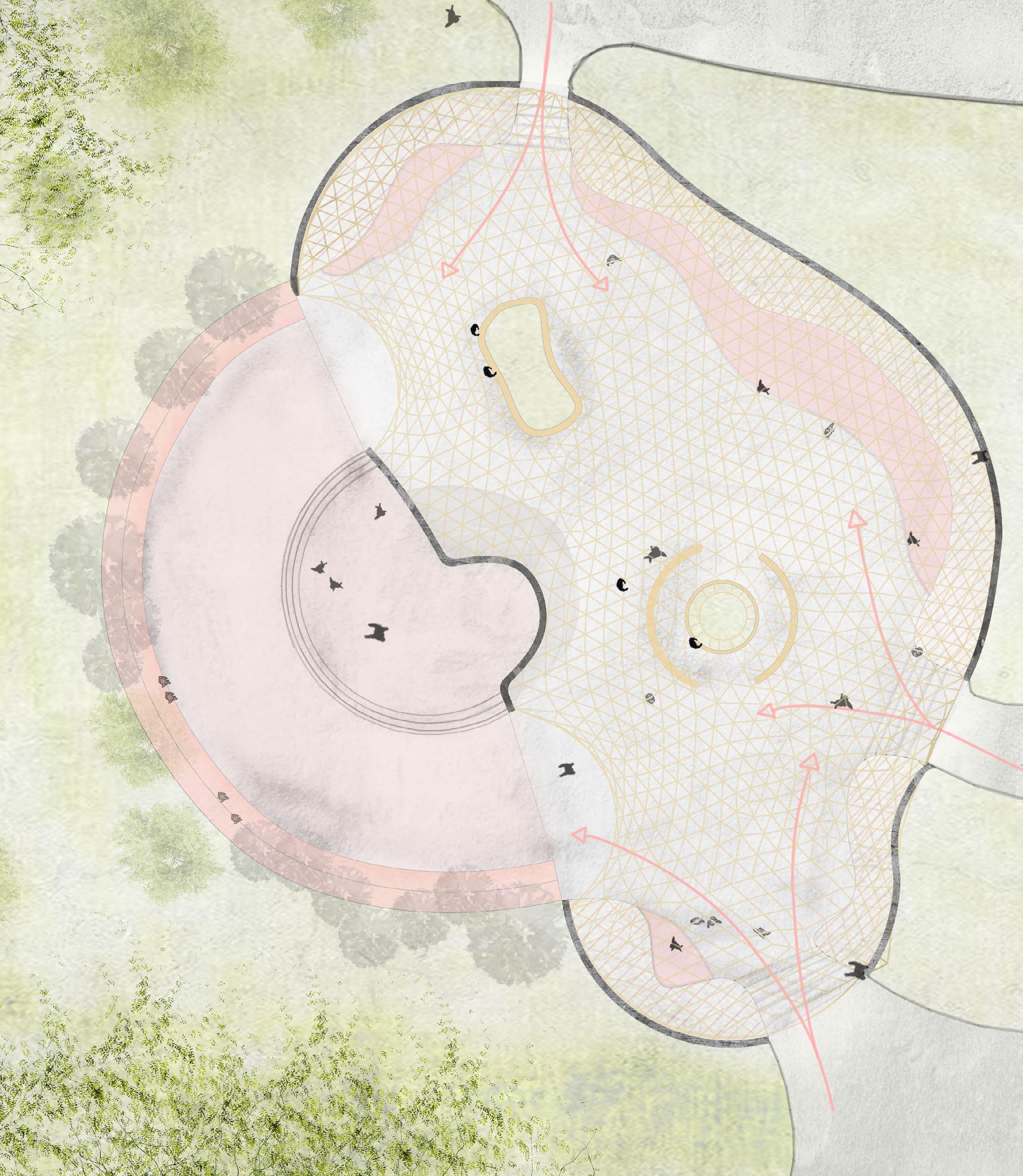
North Entrance
Interior Woven Bamboo Structure



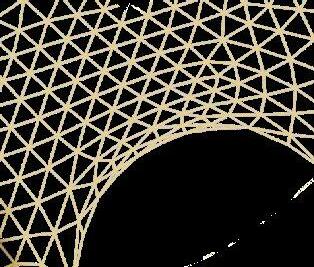
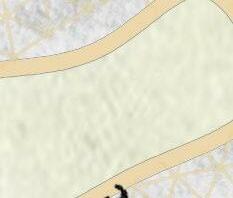
The interior of the pavilion provides enough public rest space for local residents.And The entire Canopy built by larger span Bamboo. On the other hands, rattan covered the entire canopy to create a shelter space.
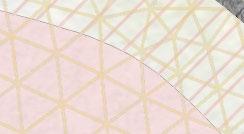
Axonometic View
Bamboo pavilion can accommodate about 20 people at same time. In addition, an outdoor stage provides for local residents on the west side of the pavilion to celebrate the local cultural festivals.

Pavilion Section
Renderings

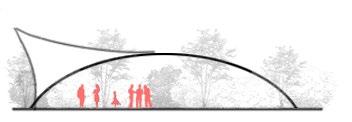

East Section1-1 1:100
Different height of roof can create more spatial experiences.


The sultry environment in Southeast Asia requires a good ventilation system for the pavilion space.
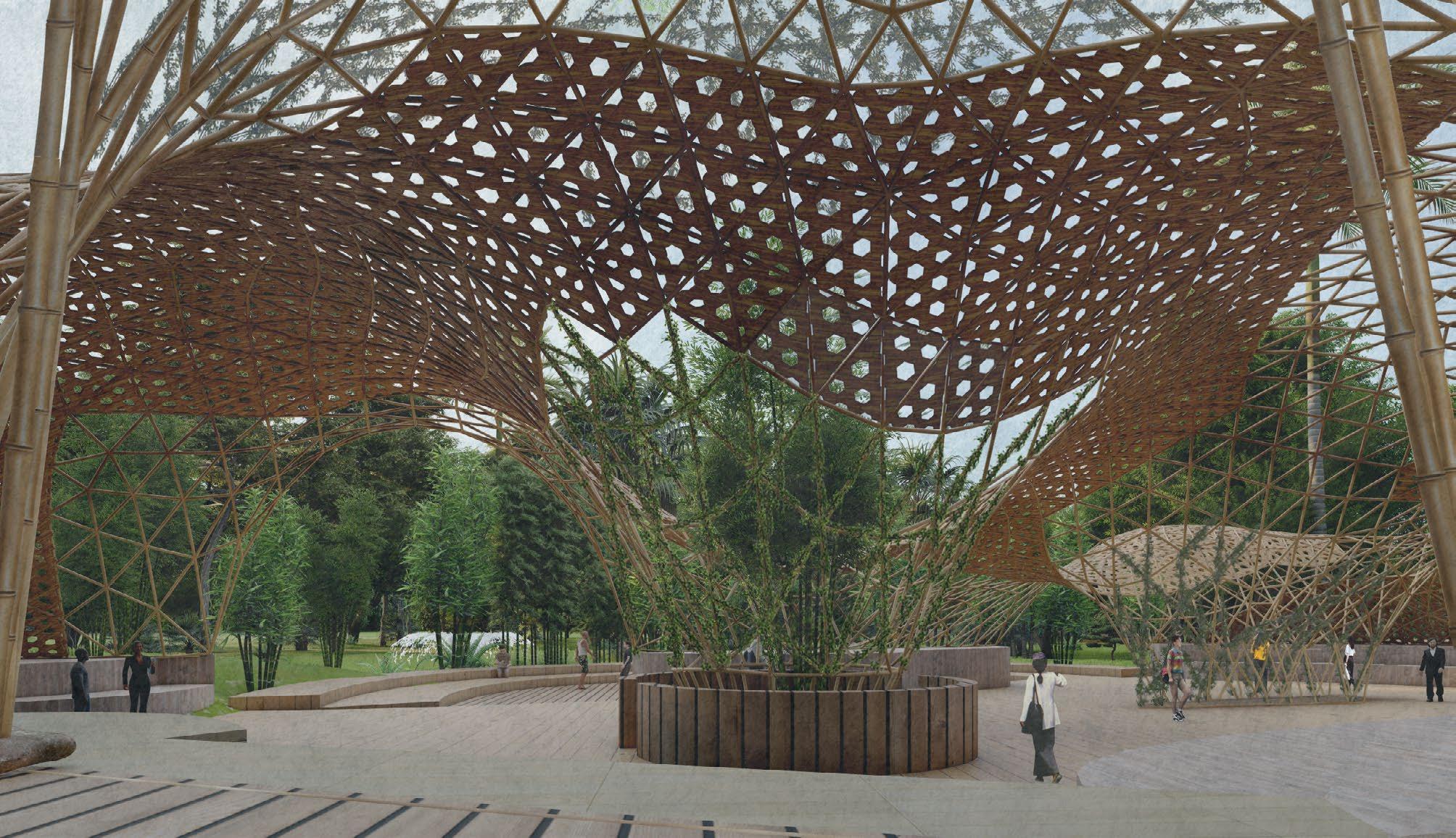
Climbing Rattan cover on the weaved bamboo structure can proof small stormrain.
An outside stage build up for providing an entertainment place for local residents.
 Pavilion Interior (rattan started growing)
Pavilion Interior (After 1 years, rattan gradually covered the entire pavilion)
Pavilion Interior (rattan started growing)
Pavilion Interior (After 1 years, rattan gradually covered the entire pavilion)
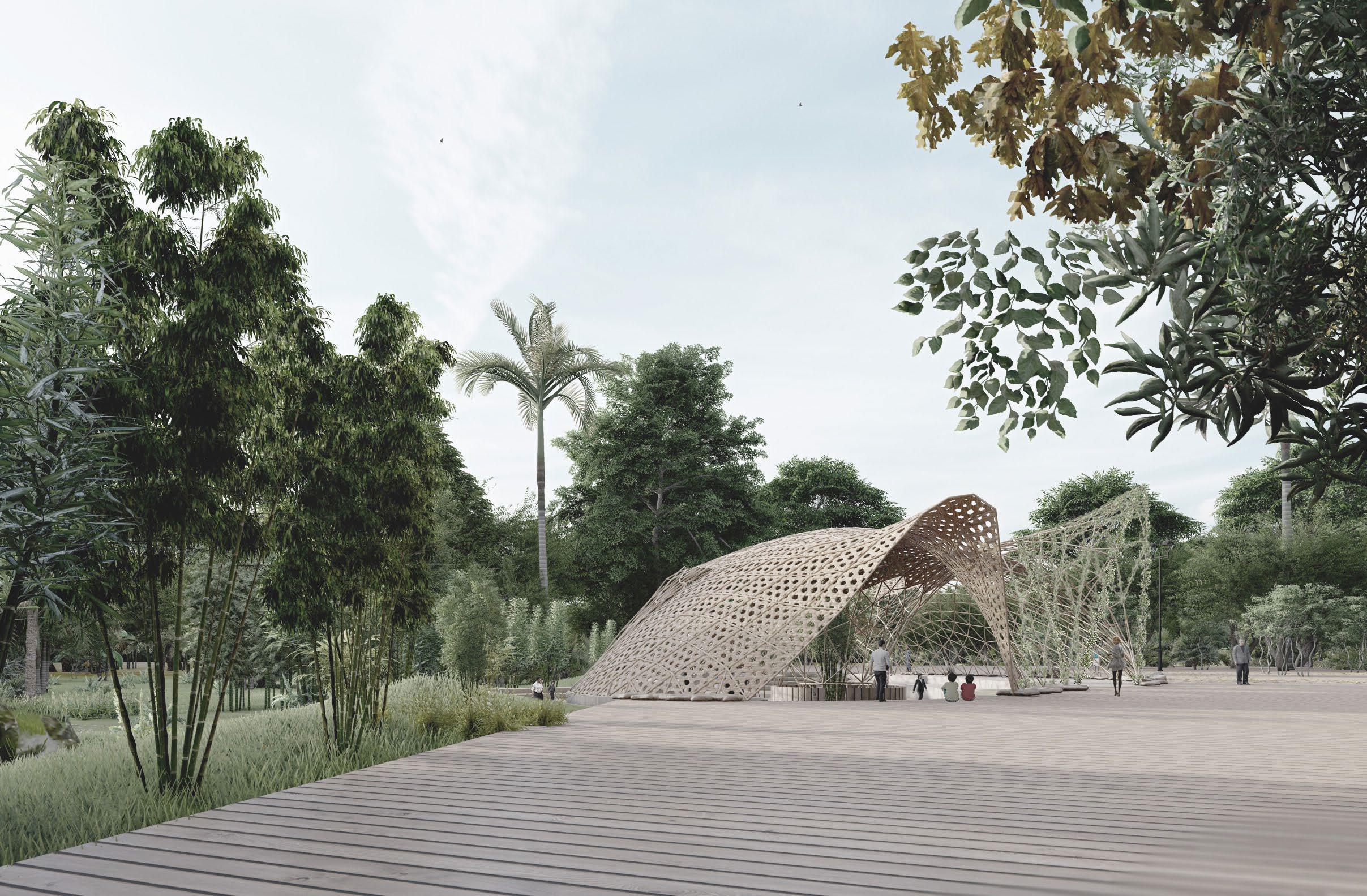
Tactile Journey In Ocean
The ocean is more mysterious to those who are visually impaired,and their perception of the world mostly comes from the senses of hearing and touch. This project investigates how to help people with low vision and the blind to perceive the ocean by touch.
The beautiful creatures of the ocean depths, with their particular patterns, can be perceived by sighted humans through photographs and images of these wonderful structures. At the same time, blind people cannot reach them. This project aims to present these beautiful creatures from the depths of the sea in their breath, their strength and their natural seeds to these visually impaired people.
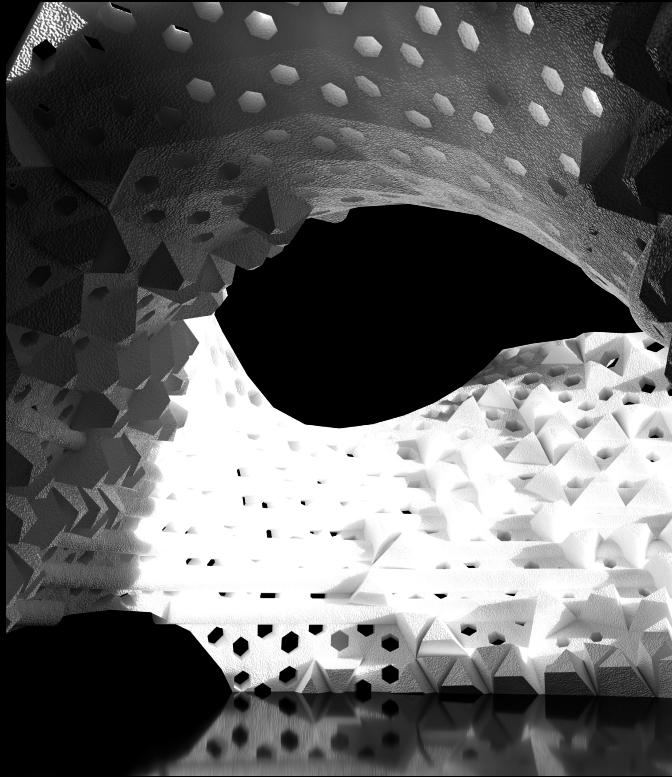
Iteration of Ocean Geometry




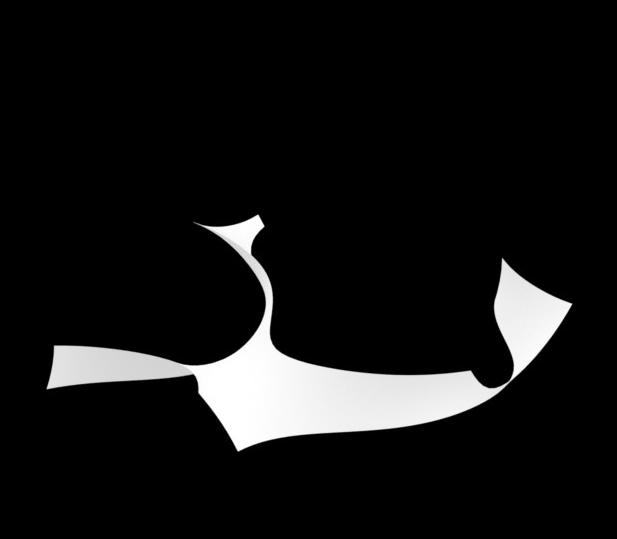

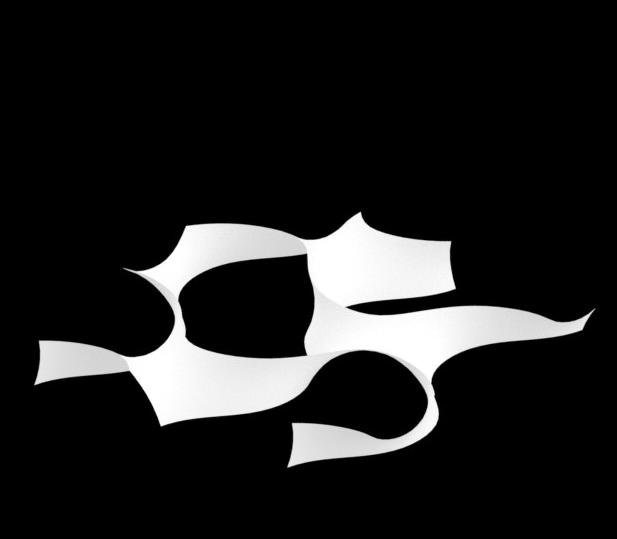
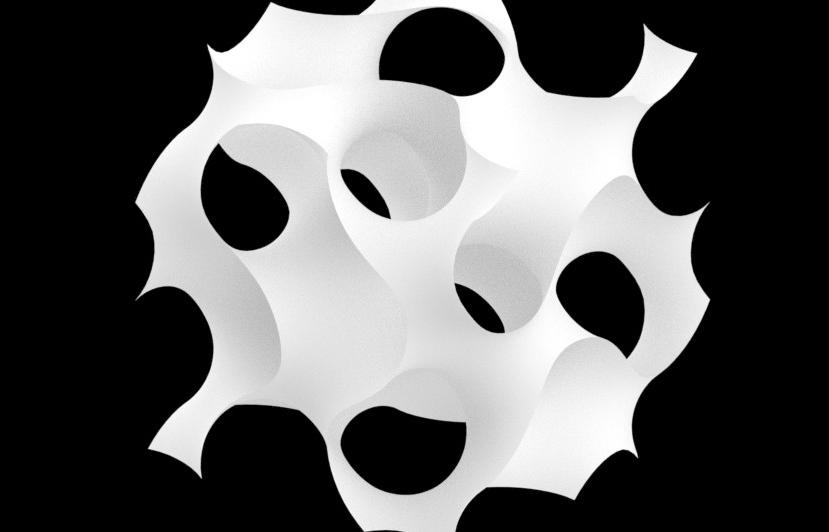

depth of interception
The result of triming
Trim the sponge geometry

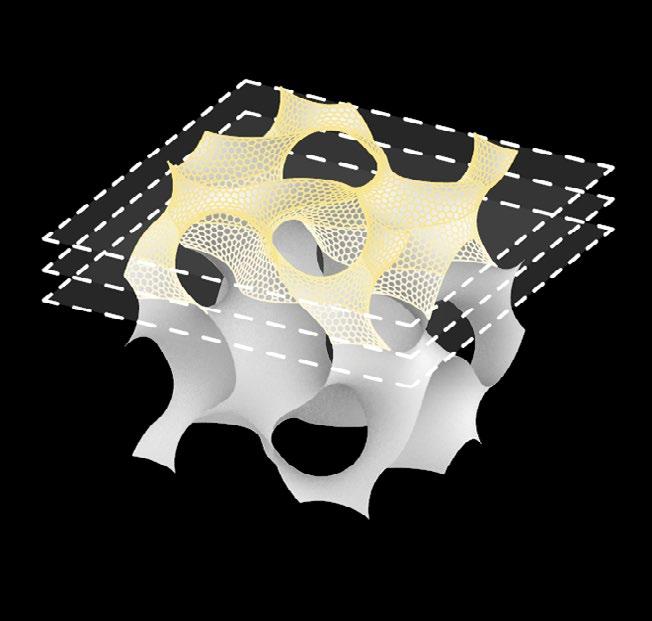


Sponges are among the strangest and oldest animals on Earth.And glass sponges are probably the most mysterious and oldest sponges.The oldest sponges. Strictly speaking, they are animals; they lack many of the basic features and have no structured organization. They have no organs. and no respiratory system, digestive system, or nervous system either. Therefore, in order to help blind people better understand marine life, we scanned a sponge model and then matched it to a more regular digital model (gyroid) for trimming to get the final one.
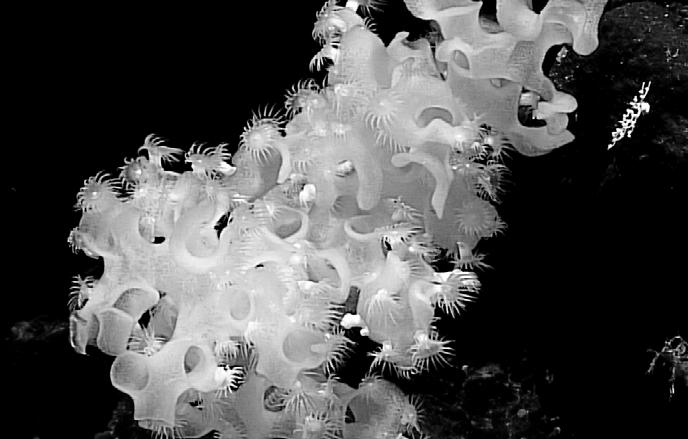

These figures show fragments in different sizes are trimed in different depths.
 Scanning model Digital model(gyroid surface)
Glass sponge Glass sponge
Scanning model Digital model(gyroid surface)
Glass sponge Glass sponge
This stripe pattern concept comes from the geometric lines characteristic of whale skin, allowing the blind to touch the regular stripes to understand the large creatures of the ocean and the vitality of the ocean.
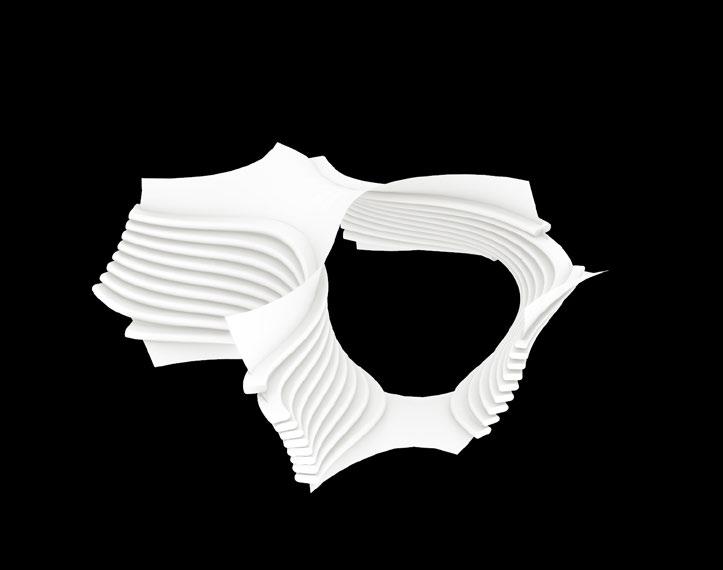
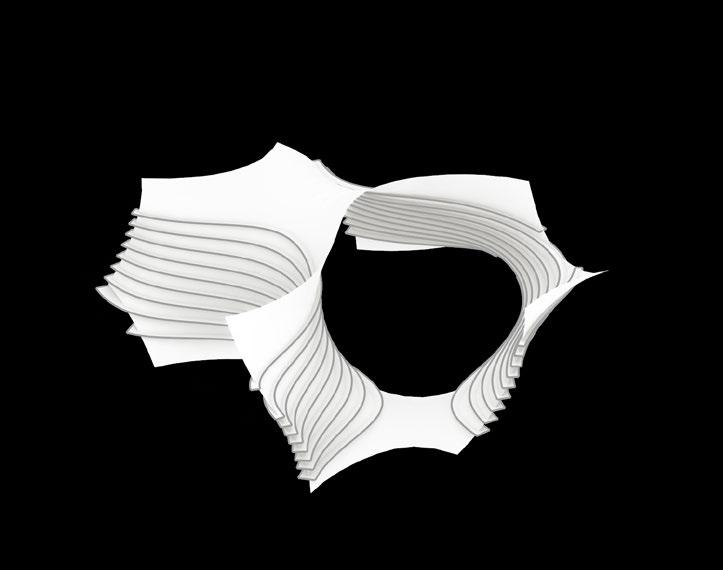
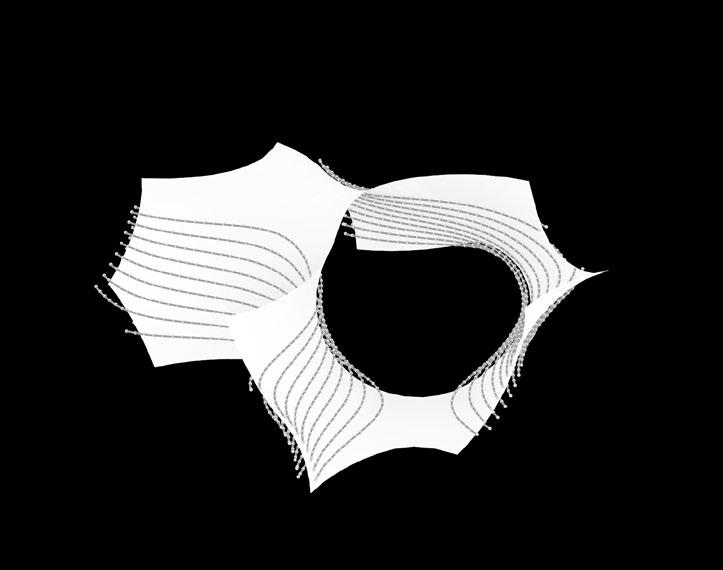
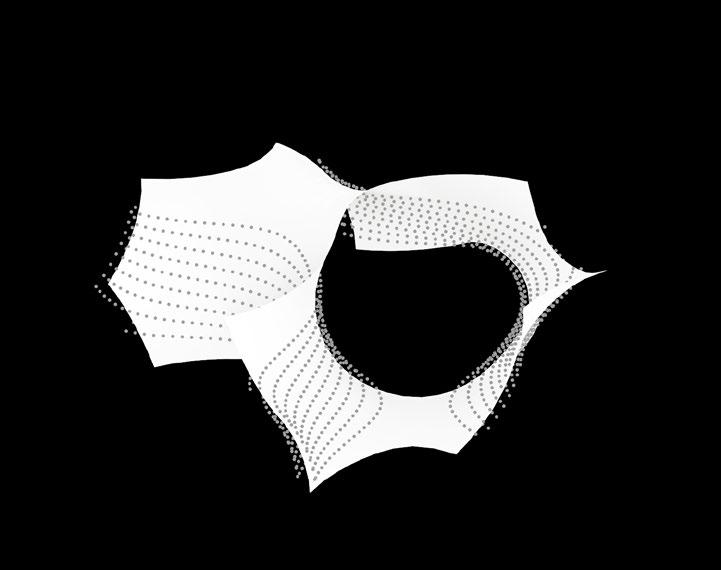
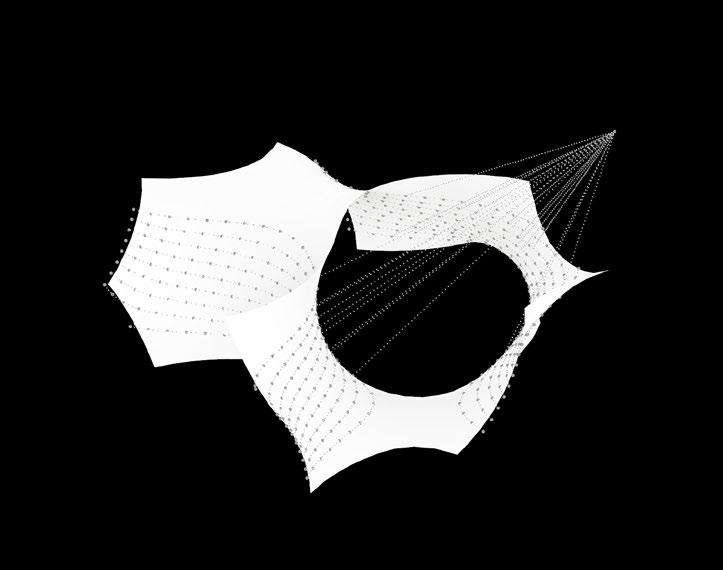
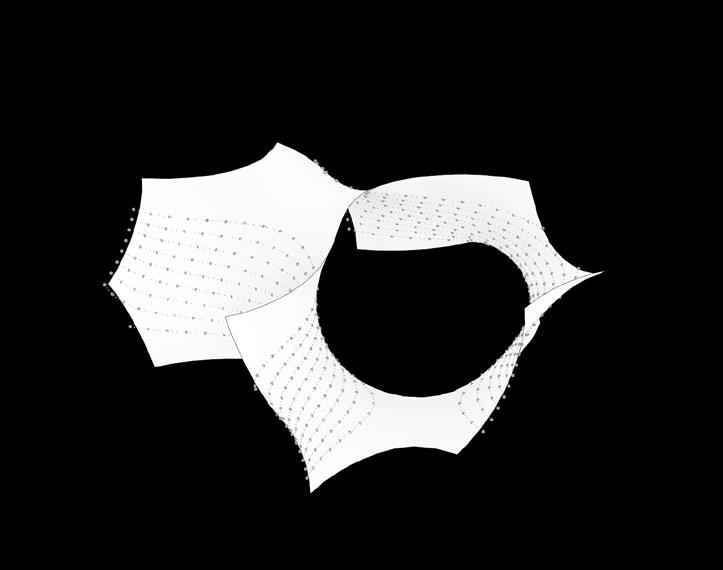
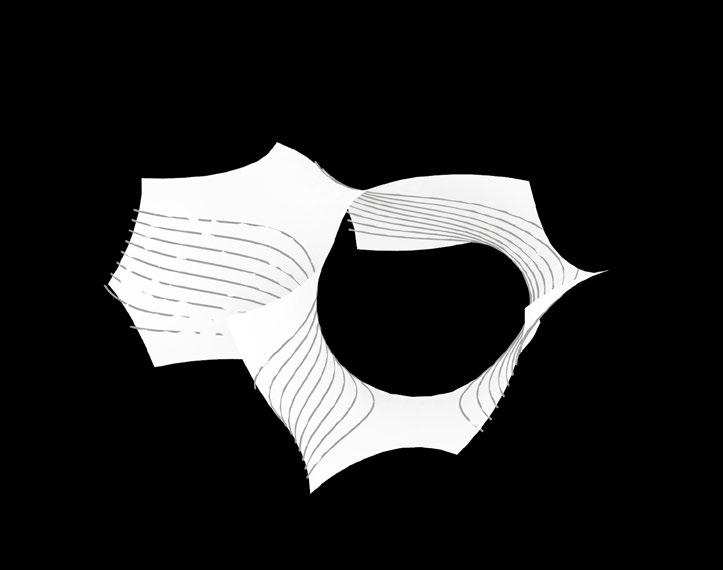
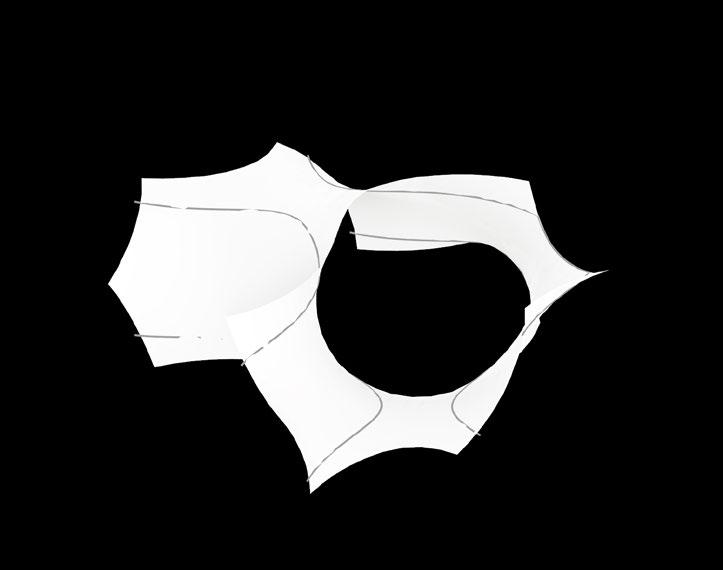
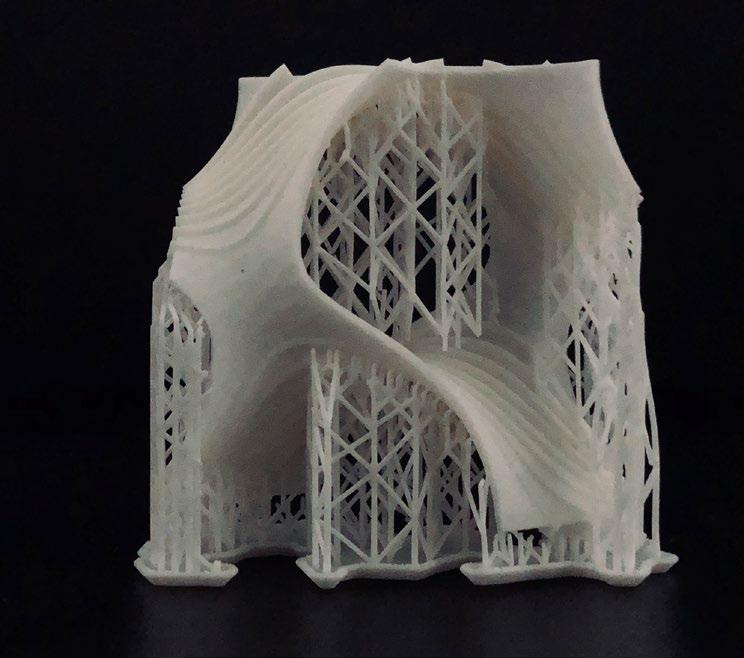
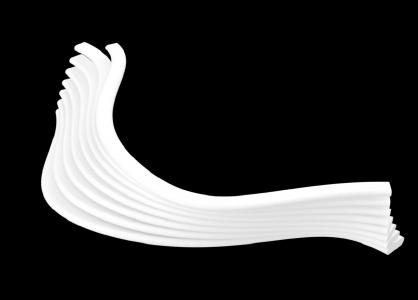
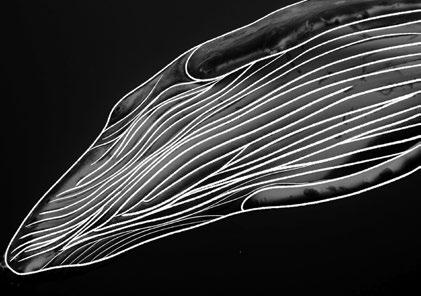

Digital Model 3D

ThisH hole pattern concept is to simulate the geometric lines characteristic of Sponge. At the same time the hole size in the pattern is randomized to more authentically simulate the characteristics of marine creatures.
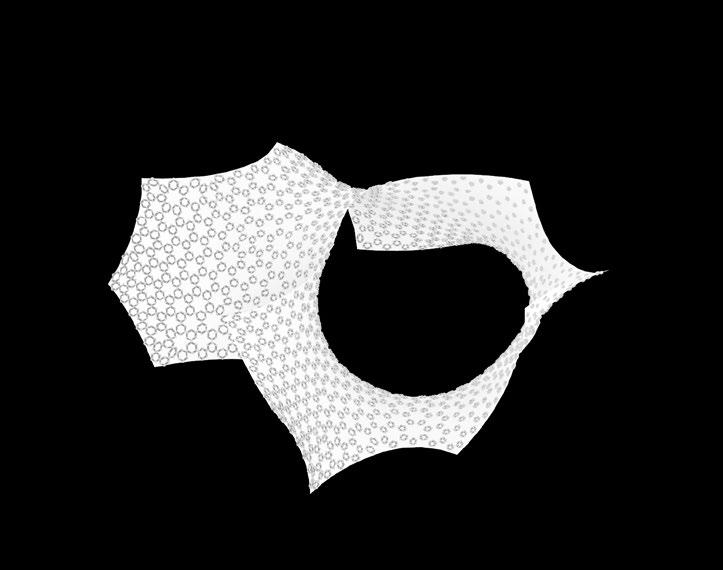

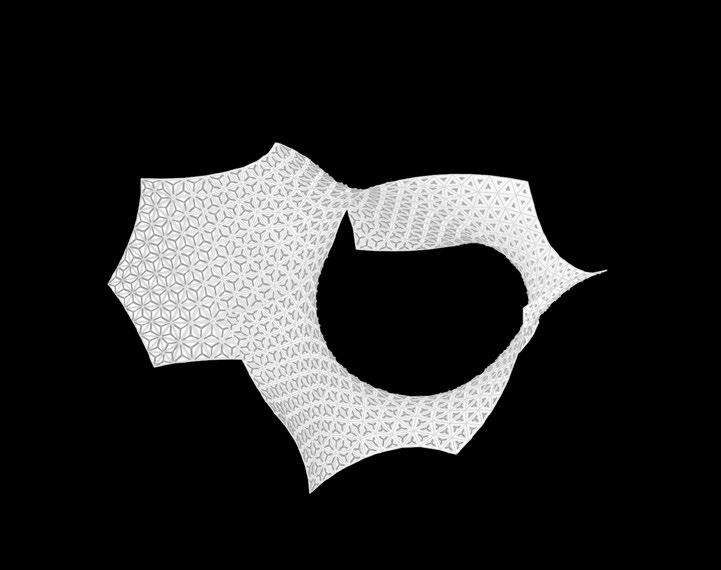


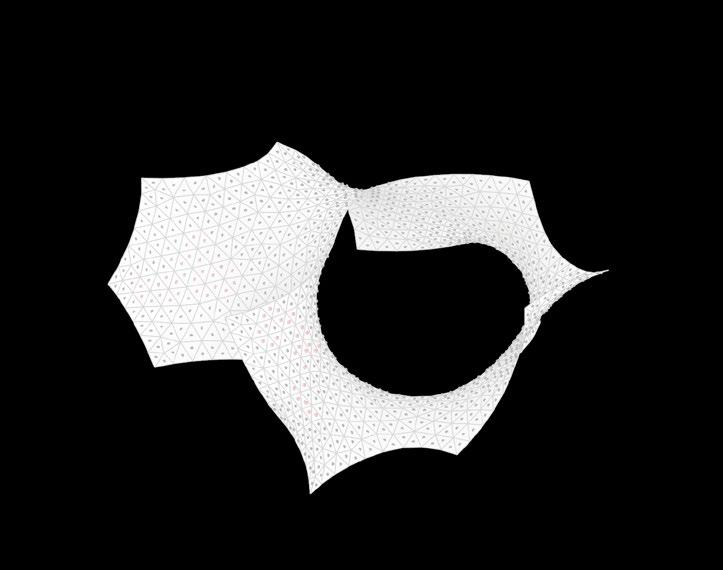

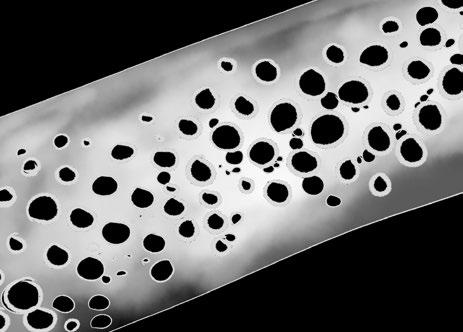
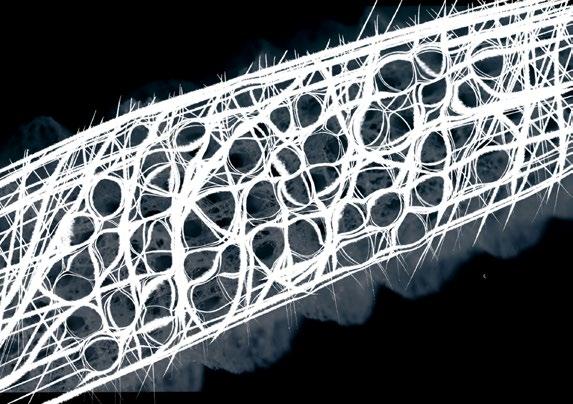
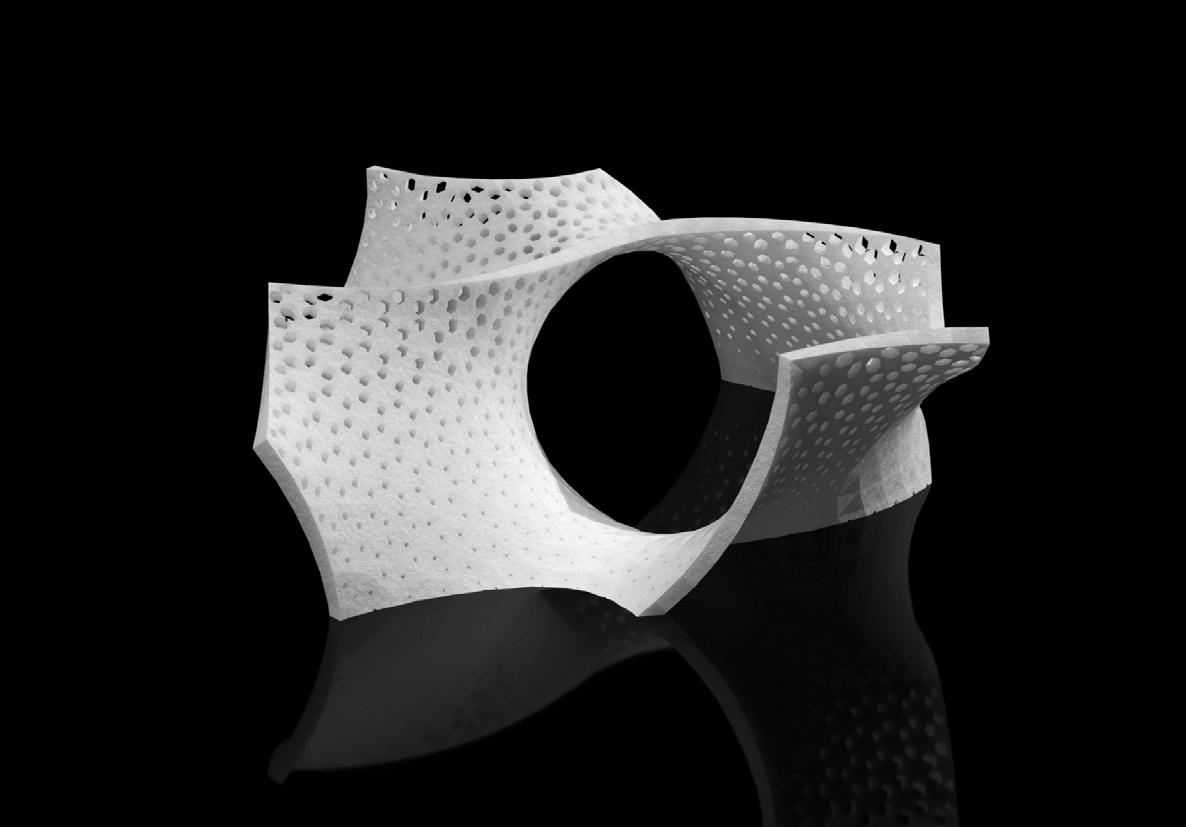 Sponge Fur-Development—Hole pattern(Breath)
Sponge Fur-Development—Hole pattern(Breath)
The parasitic relationship in the ocean is demonstrated by representing the barnacles growing on the surface of the whale's skin through the raised geometry on the prototype.


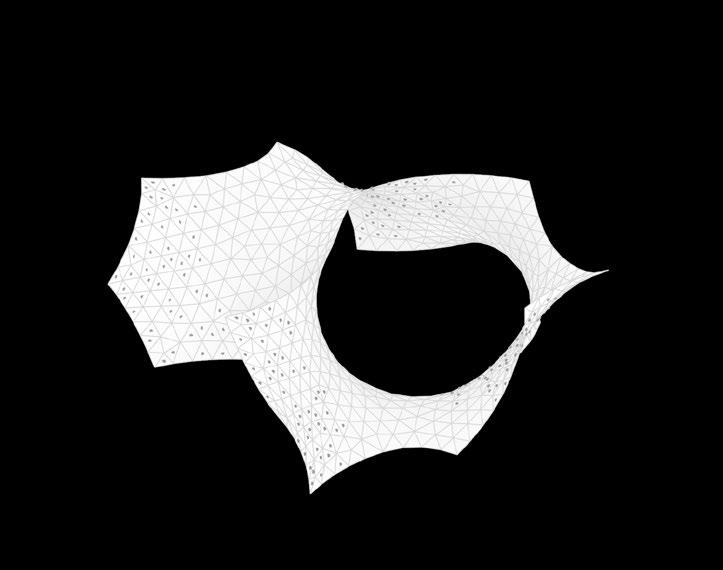


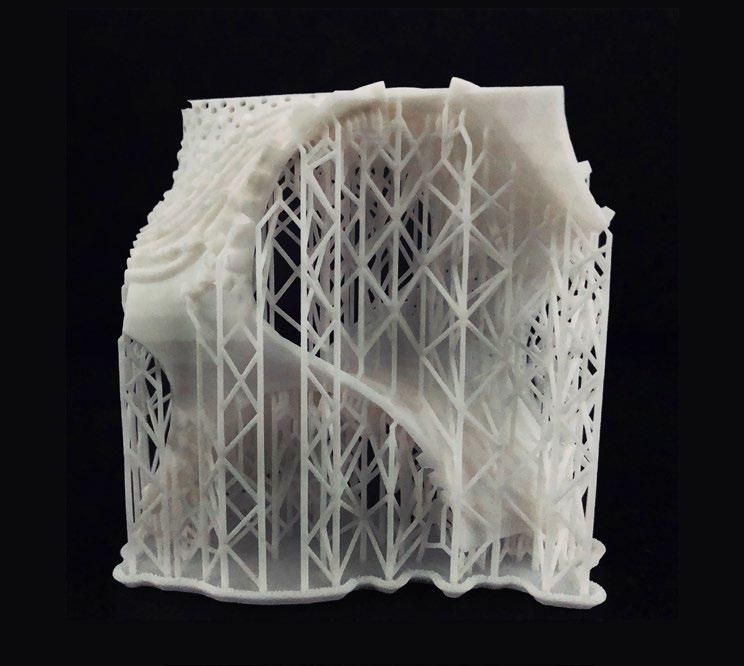

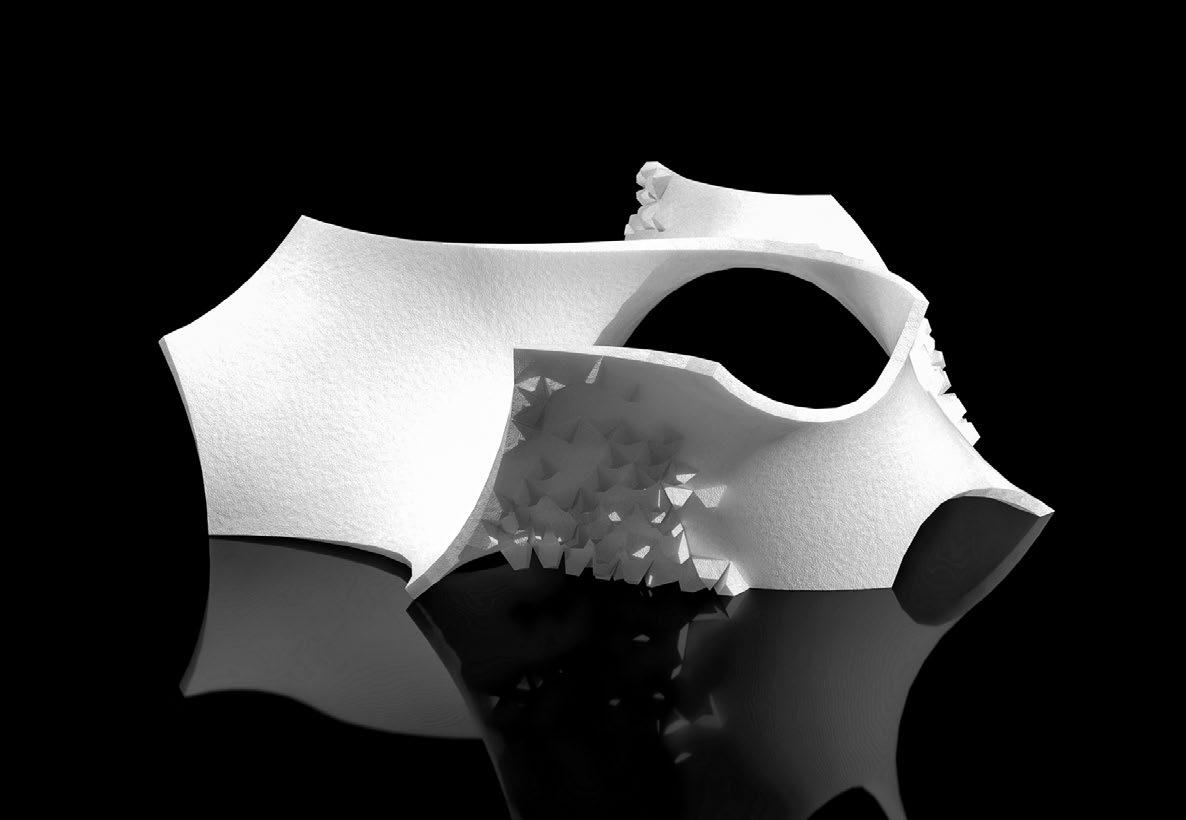
1.Divide the basic surface of geometries by triangle shapes.
Filter these triangles and choose the areas close to boundaries.
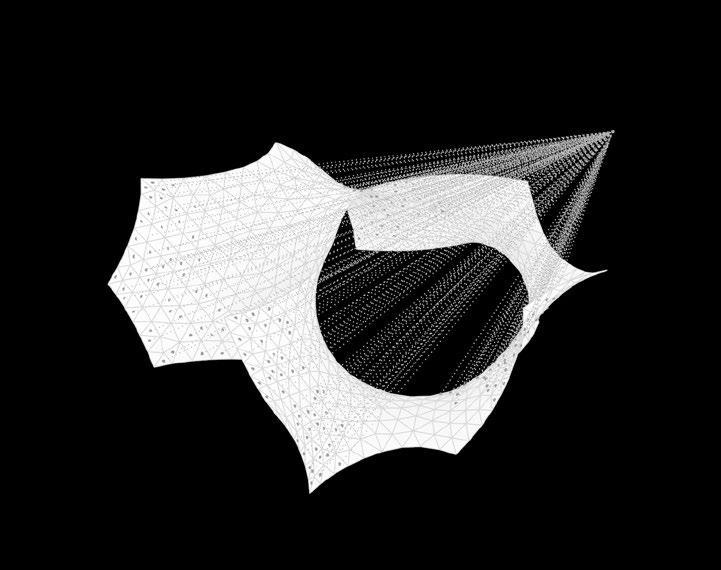
Randomly pick some triangles. 4. Create centers of these triangles. 5. Calculate the distances of centers to reference points as basic data. 6. Offset the nake edges of every triangle surface through the basic data. 7. Loft these triangle curves to create geometries.

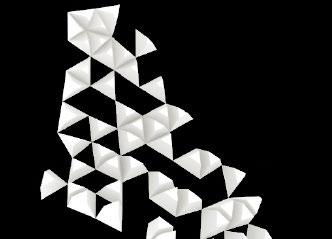
Combination

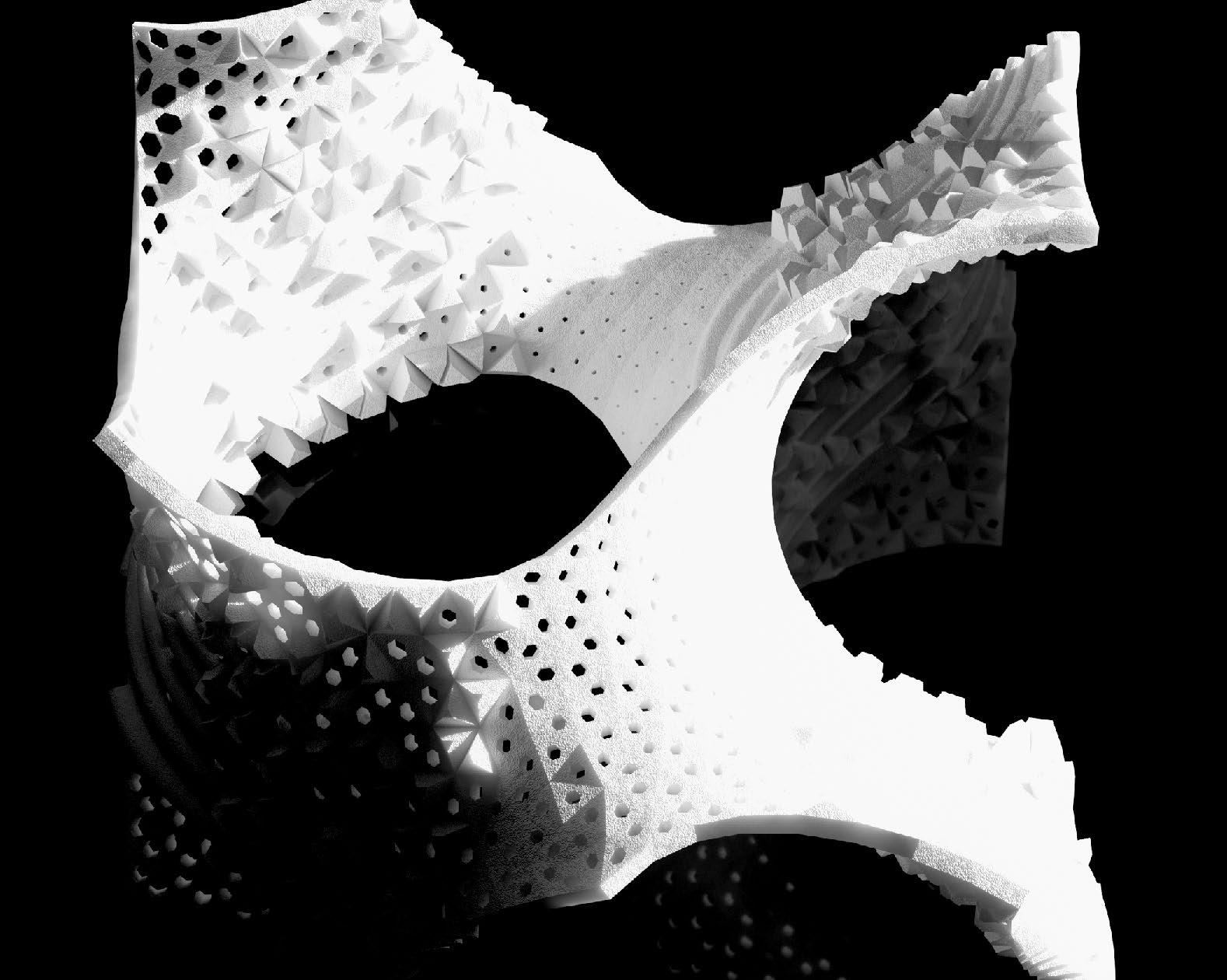

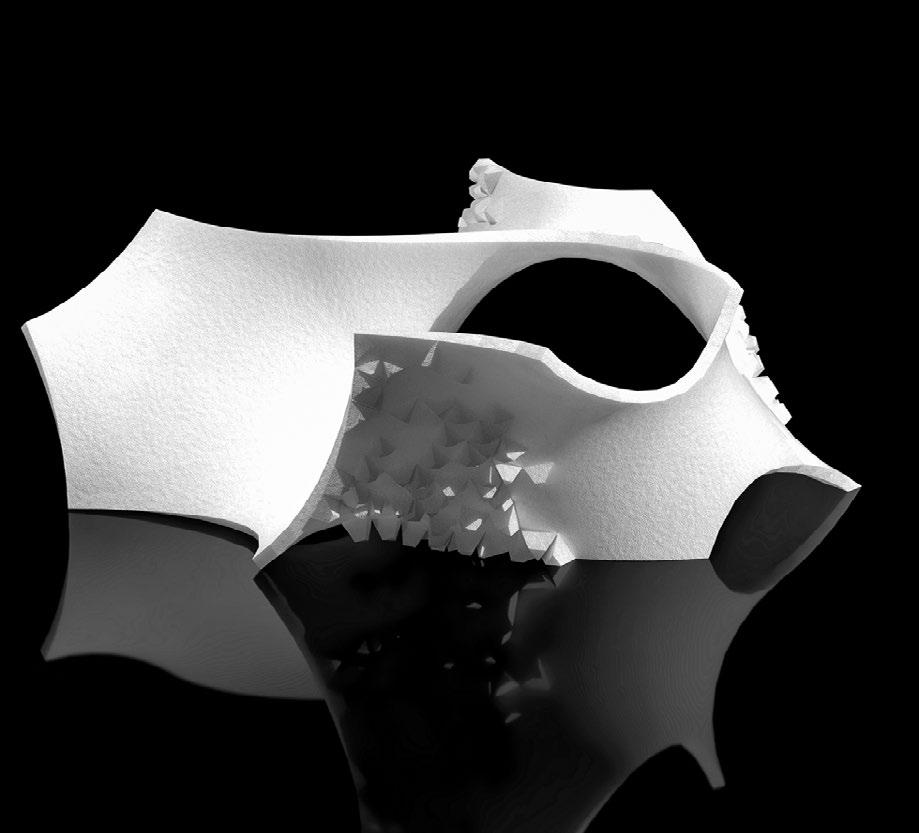

 Whale-Stripe
Sponge-Hole
Barnacle- Rising
3D Print
Whale-Stripe
Sponge-Hole
Barnacle- Rising
3D Print
Work Process of Robotic
x2
Tactile Chair
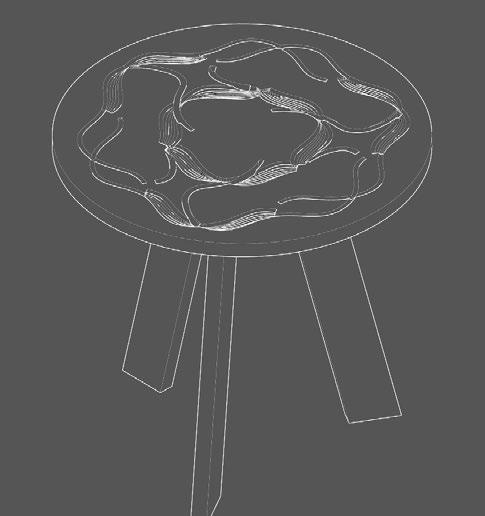
Select some features of the prototype and pre-formulate the pattern by the Robotic.
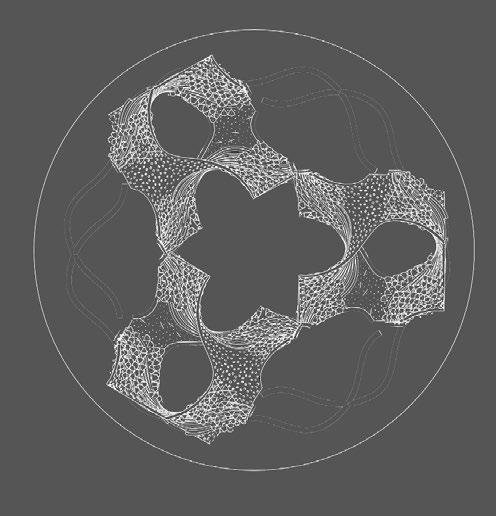
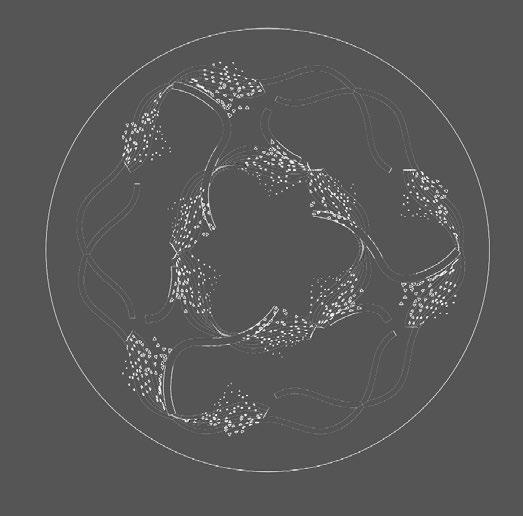
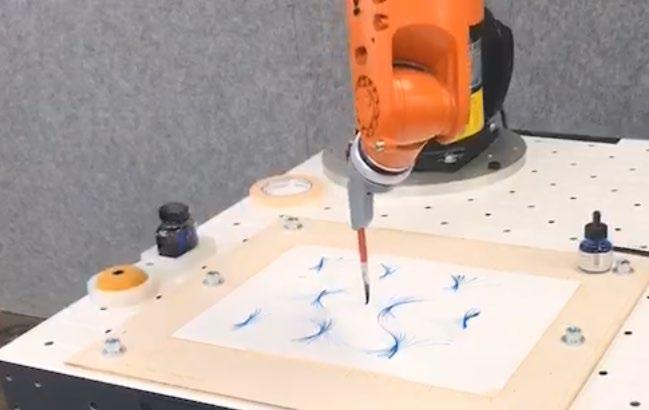

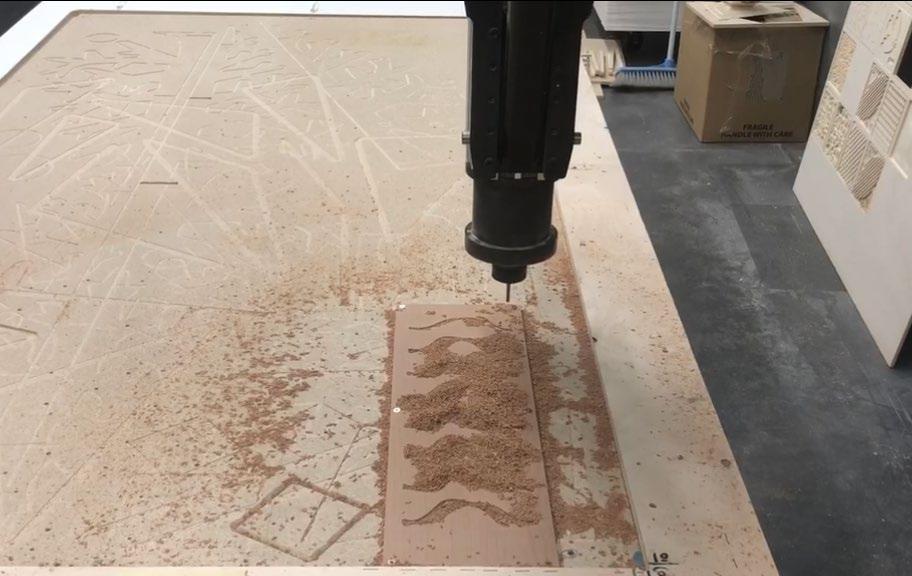

The final project we would like to present is a chair that combines 3D printing and wood working. In order to give a good tactile sensation to the blind, we carved the pattern "WAVES"characteristic of marine life by means of a robotic arm KUKA prc, facilitating their perception of the ocean through touch.
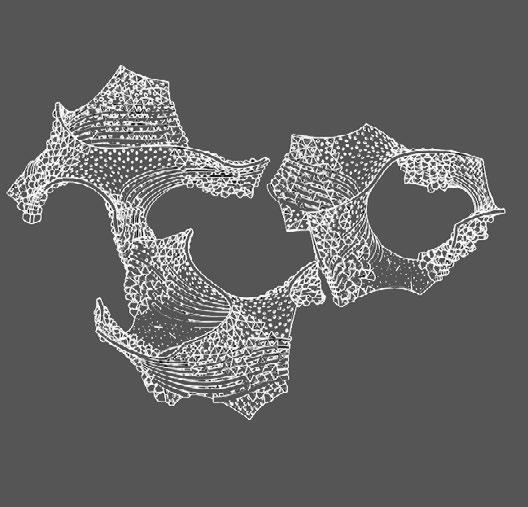
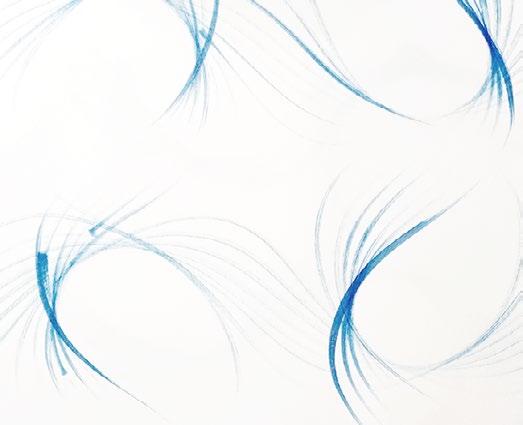
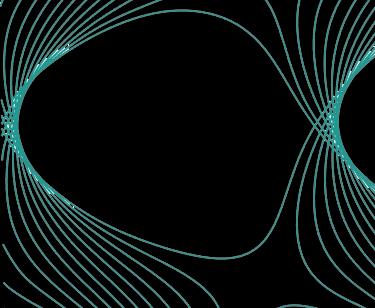
The visitors can also access the different ocean-creature skins by the 3d print model on the top of chairs. Additionally, Brailes used to explain the topic are implemented on this chair by inserting some metal protrusions.
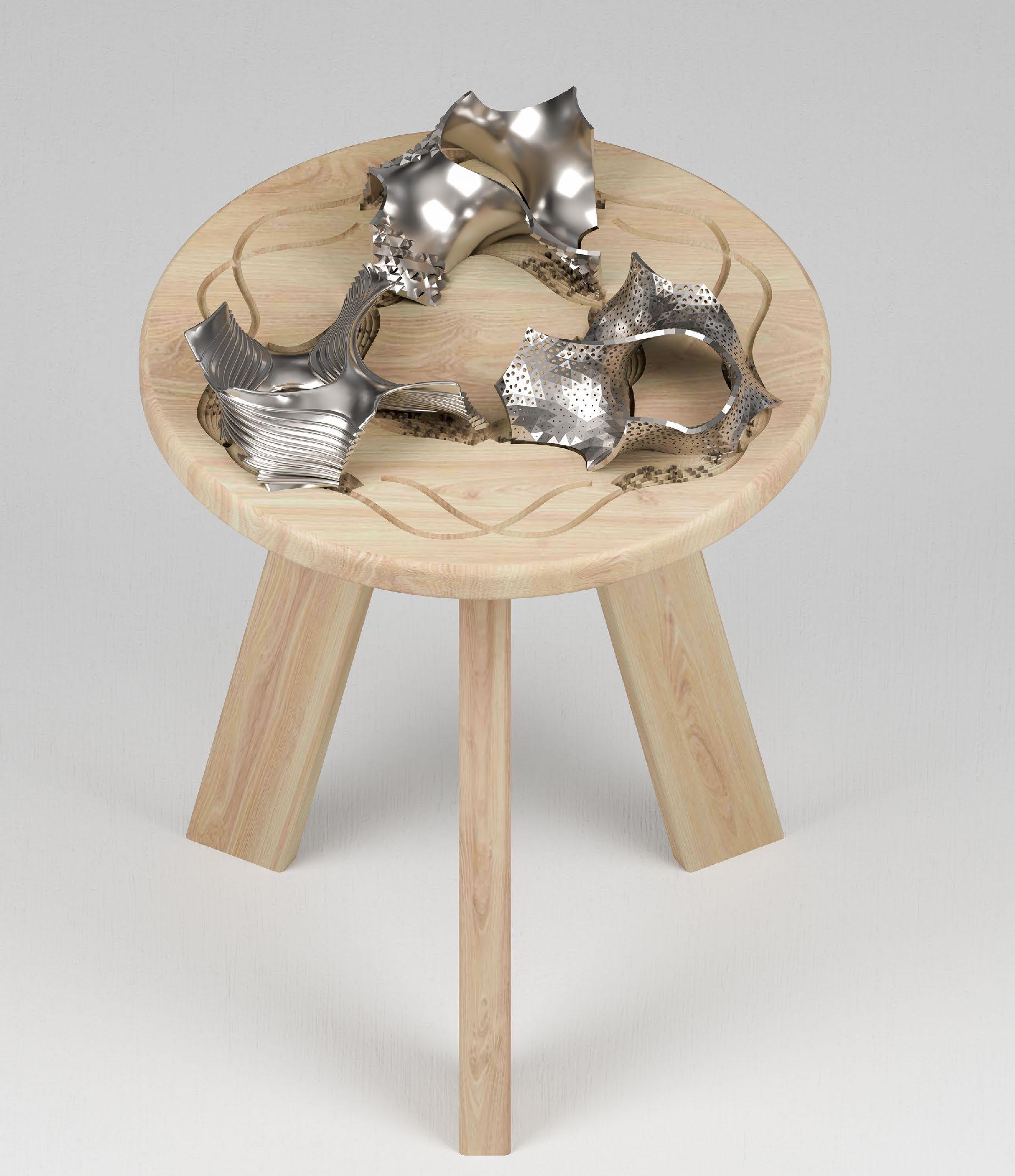 Draw Pattern with robotic arm Carved Pattern with robotic arm
Robotic arm operation simulation
Robotic milling
3D print Adding Braille pattern in plan Tactile plan with 3d print
Barnacle
Sponge Whale
Draw Pattern with robotic arm Carved Pattern with robotic arm
Robotic arm operation simulation
Robotic milling
3D print Adding Braille pattern in plan Tactile plan with 3d print
Barnacle
Sponge Whale
Capability- Rendering
JSA STUDIO
In the preparation of the DA documentation, I was mainly responsible for assisting the senior architect with the rendering process. Also, in order to better express the relationship with the surrounding buildings, the model is often combined with the field site to show the building materials and the surrounding architectural style.
Rendering Software: V-ray, Enscape, Lumion,D5 Render

The rendering is for DA, using the software Lumion.
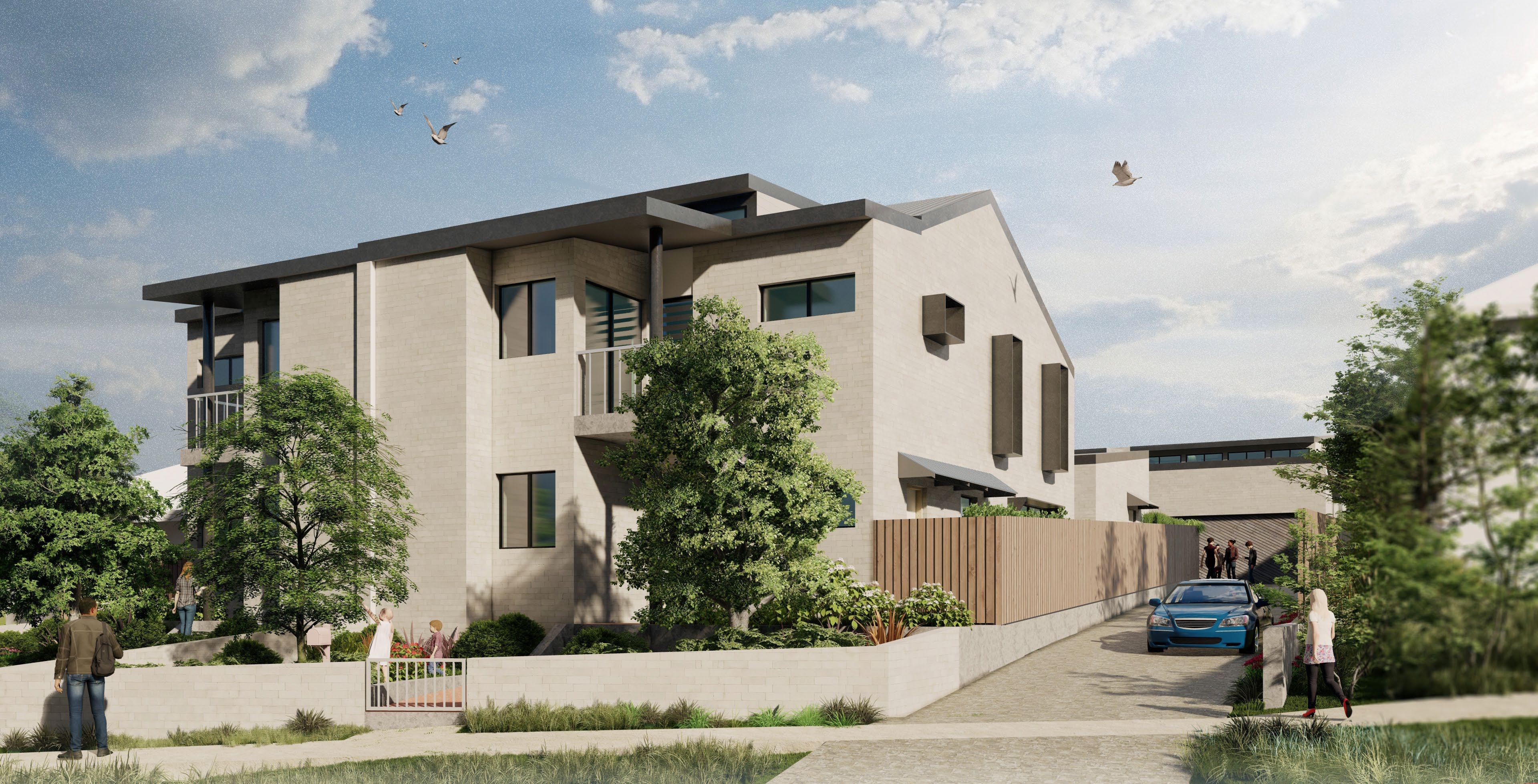
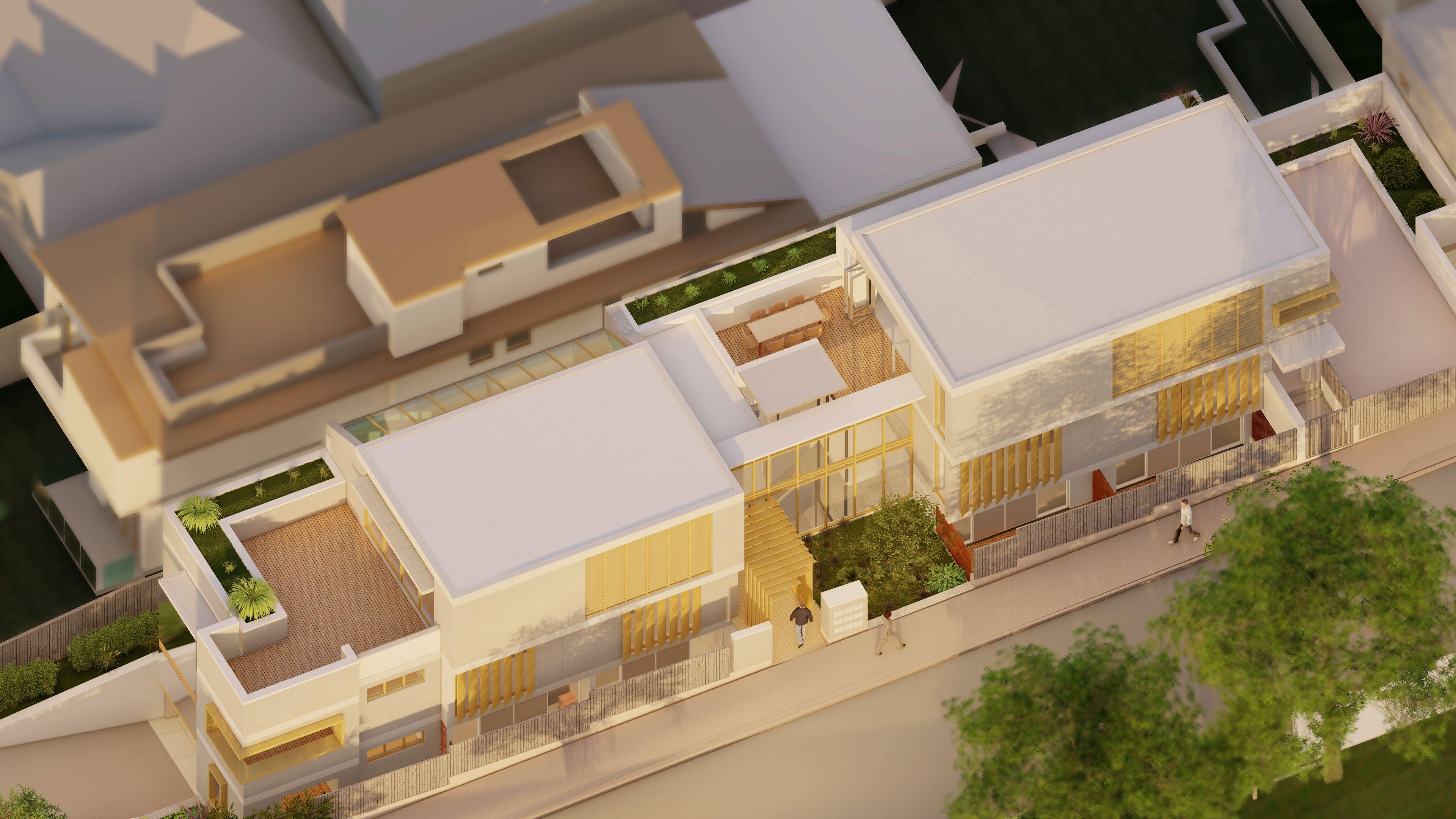 The rendering is for DA, using the software Enscape.
The rendering is for DA, using the software Enscape.
THANK YOU
My heart is full of thank for my parents for supporting me in completing my postgraduate degree in architecture. Also grateful to my friends and JSA for helping me with my studies and learning work, it was overwhelming to have your guys support, sincerely.
